Building upon his captivating performance during last year’s launch of After the End of History: British Working Class Photography 1989-2024 (curated by Johny Pitts), we are delighted to welcome back Cappo to present a free weeklong exhibition entitled CAPStone.
This installation will be a physical translation of the concepts and themes found in the critically acclaimed music of this hugely important and influential Nottingham rap artist.
Exploring new possibilities for the alignment of hip hop lyricism with more traditional artistic mediums, CAPStone attempts to reevaluate how music is perceived, contemplated, and represented in contemporary settings by deconstructing the sounds, thoughts, and feelings contained within it.
Developed and curated with the help of sound artist Tom Harris, and based upon two thirds of the CAPStone LP trilogy (submitted as part of Cappo’s recent doctorate in English, Creative Writing, and rap music), themes of isolation and sociality (in abstracted forms) serve as backdrops for the piece, manifesting as two core experiences:
S.T.A.R.V.E. invites participants to experience isolation amongst the multitudes as part of an age-old narrative inherited by myriad artists, musicians, poets and authors to highlight the potential of loneliness as catalyst for mental health decline.
Houses speaks to an understanding of human existence as being profoundly social. Here, through visual, performative, and communicative means, the innate drive within us to remain part of a collective is uniquely interrogated.
The contrast between solitude and sociality — or separation and inclusion — has long been a subject of artistic investigation. Carrying this tradition forward using modern methods of expression, CAPStone intertextually engages with multiple artistic movements and eras to help revise these fundamental elements of the human condition.
Dr Paul Adey is lecturer of Popular Music and Music Business at Nottingham Trent University’s School of Art and Design. Performing under the artist name of Cappo, he has practiced hip hop lyricism for over two decades. During this time, he has had the privilege of appearing at many of Europe’s premier live music venues, performing alongside artists such as Public Enemy, Skepta, and The Sleaford Mods.
Paul’s interdisciplinary research focuses on popular culture, literary devices and musical concepts such as intertextuality, allusion, and the semiotic analysis of song lyrics. The nature of Cappo’s praxis links his work to rap music, English literature, Creative Writing, and media studies.
Instagram: @kafka_poe_murakami
X: @CAPPO_GENGHIS
Linktr.ee: @_Cappo_
Tom Harris is a sound artist based at Primary in Nottingham, working at the intersection of sound engineering, electronic improvisation, musicianship, and contemporary art. His multifaceted practice wholeheartedly embraces fusion—bridging disciplines such as installation, live performance, essay writing, and collaborative movement work.
Tom’s approach to sound is both technical and intuitive, thriving in interdisciplinary spaces, where sonic experimentation meets visual and physical storytelling.
Recent projects include:
Sonic Service Series – deep electronic improvisations (2025 – ongoing)
Lost in the Hills festival – sound installation/performance with Juliana Day (2025)
Samia Halaby: Performing Abstraction at Nottingham Contemporary with Guohan Zeng and Owen Campbell (2025)
Sonic Sculpture exhibition series with Near Now and Primary (2024)
Emerald Island – Arts Council DYCP award (2024)
NTU Graduate Fashion Show – live score (2023)
Our Acres by Solomon Berrio-Allen – performance live score (2023)
Mixed Feelings – featured by the British Music Collection (2023)
Links:
Tom Harris: Artistic direction/sonic sculpture
Dan Gardner (aka Theorist): Video Design
Danny Boyes: Installation artist
Mr Brown (Bee Graphics): Graphic design
Congi, Theorist, Sam Zircon, King Kashmere, and Dr Zygote: Musical accompaniment
Join multidisciplinary artist and illustrator Arianna Tinulla Milesi for this free, two-day workshop in response to our current Bonington Vitrines exhibition Nottingham Subcultural Fashion in the 1980s.
We’re delighted to welcome Arianna, who is currently in residence at NTU on the AA2A programme, to run this public workshop. Through her ongoing project This room has no walls anymore, just endless trees Arianna creates shared spaces through the act of drawing – making opportunity for discussion and the sharing of knowledge, storytelling, materials and skills.
Responding to themes in our Vitrines exhibition, Arianna will explore relationships between fashion, devotional and ritual orientated contexts. You don’t need to have skills in sewing or making and we’ll provide all the materials – though you are invited to bring along an item of clothing to work with on day two if you’d like to.
On day one of the workshop, Arianna will introduce you to some of the key themes in her work. You’ll use these as prompts, encouraging you to share your own experience of ritual, participation in groups, and subcultures – or to simply share your personal responses to the exhibition. The aim is to create a communal and safe space to hold these different types of experience precious.
Day two of the workshop will be more practical and hands-on. You’re invited to customise an item of clothing, channelling some of the thinking from the first day – what clothes communicate, re-interpreting the purpose of clothing, rituals, and ideas of belonging.
About the artist: Arianna Tinulla Milesi
Arianna Tinulla Milesi is a multidisciplinary artist and illustrator based in the UK. Drawing is the core of her work, not only as a practice but also as a cognitive tool to understand reality and create. Coping mechanisms, devotional art, seaweeds, the formation of memories and syncretism are pivotal points in her research, which is open and interactive.
Arianna is a member of the Council of the Society of Graphic Fine Art (SGFA). She collaborates with art institutions all over the world and is devoting an increasing amount of time to the organisation of workshops oriented to nature, to make wearable art, to convey human connections and mental health.
Bonington Connects
Bonington Connects is a series of talks, discussions and workshops planned by Nottingham Trent University students, inviting people to engage in thought-provoking conversations in response to the Gallery’s exhibition programme. It aims to create an accessible atmosphere, encouraging exploration of the exhibitions in an informal, open and engaging setting. This workshop has been planned and organised by final-year MFA Fine Art student, Vidhi Jangra.
We are pleased to acknowledge that funds from NTU TILT have supported this event.
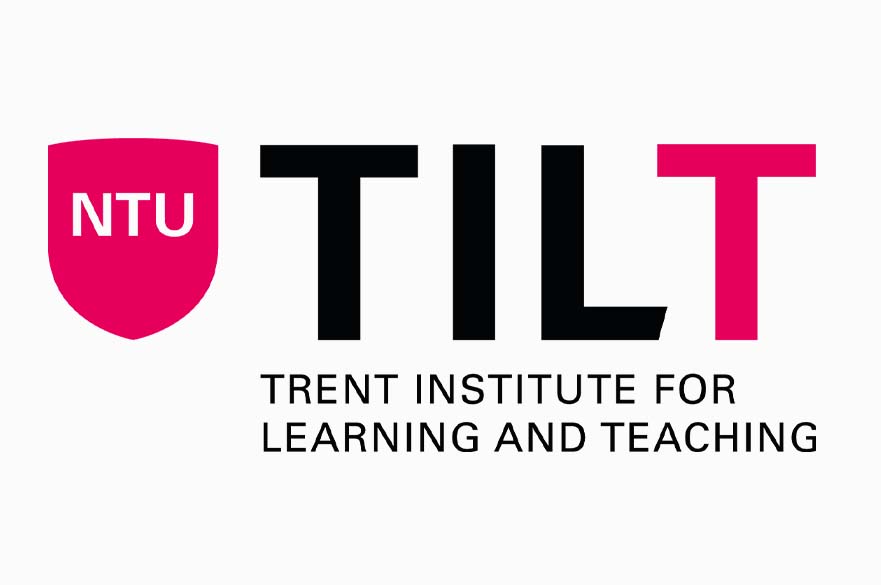
Join Weird Hope Engines‘ co-curator, Jamie Sutcliffe, for a free guided tour of Bonington Gallery’s latest exhibition.
In this guided tour, writer and Weird Hope Engines co-curator Jamie Sutcliffe will discuss the themes of the exhibition while exploring tabletop roleplaying games as potent tools for imagining radically different possibilities. From the transformation of the self to the evolution of social organization, this tour will introduce the artists behind each work in the show and explain how their various approaches to game design might position play as a unique form of speculation.
This event will last up to an hour. Please meet inside Bonington Building in the foyer space outside the Gallery doors at 12.55 pm. Free and open to all, booking required.
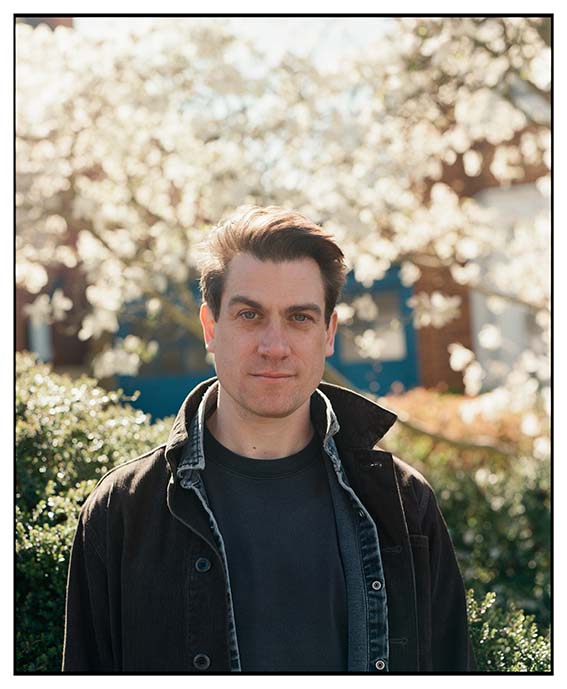
Image: Jamie Sutcliffe by Robin Christian
Jamie is a writer, curator, and co-director of Strange Attractor Press. His work explores artistic encounters with science fictive fabulation, the politics of gaming, animation and its multiple entanglements with developments in the life sciences, haunted media, and the persistence of myth, all understood as technologies of selfhood.
His essays, interviews and reviews have been published internationally by Art Monthly, Art Review, e-flux Criticism, Frieze, Rhizome and The White Review. He is the editor of Documents Of Contemporary Art: Magic, published by The Whitechapel Gallery and The MIT Press, and co-editor of Weeb Theory, a collection of theoretical resources for artists encountering the intermedial fan cultures of animatio
In our latest archive display we take a closer look at Descendants of the Dragon, 1991. This exhibition highlighted the Chinese community within Britain, looking at the importance of the dragon within celebrations. The exhibition showed many sculptural/puppet works which were related to the dragon and other animals that are present in ritual celebrations in Chinese-British culture.
Descendants of the Dragon showcased Chinese artists based in the East Midlands, as well as works from China. The majority of the space was filled with sculptural works that were used in ritual and festival settings featuring a large dragons head at its centre, and a long boat to the side. The ceiling of the gallery was covered with kites of different animals, including cranes, eagles, owls, and butterflies.
Curated by Alex Jovčić-Sas, the Archive cabinet contains photographs from the original exhibition, alongside condition drawings/reports for the main piece which sat in the centre of the gallery. There are also some of the original captions which have been written in mandarin and translated into English.
This exhibition has recently been researched by Dr Vivien Chen who was looking into diasporic East Asian artists in the East Midlands.
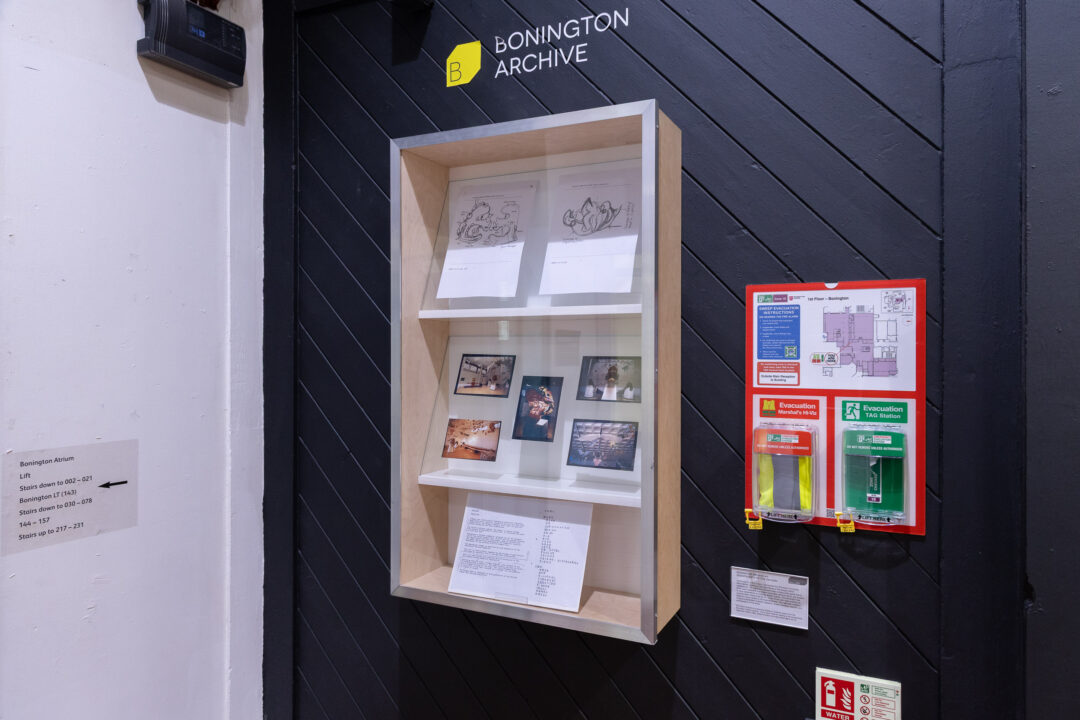
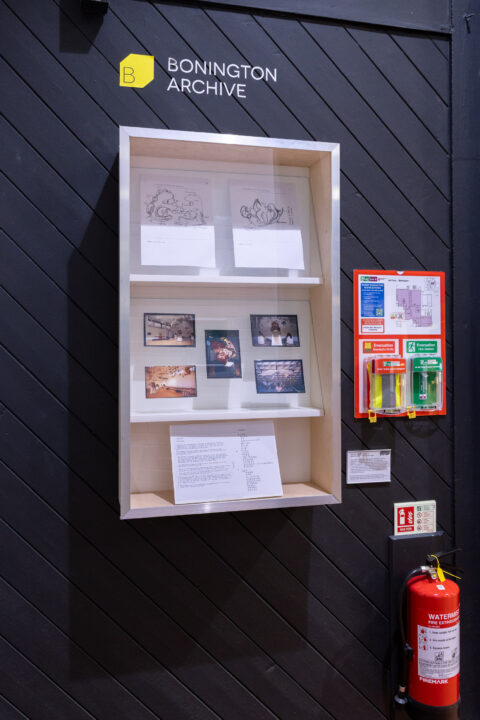
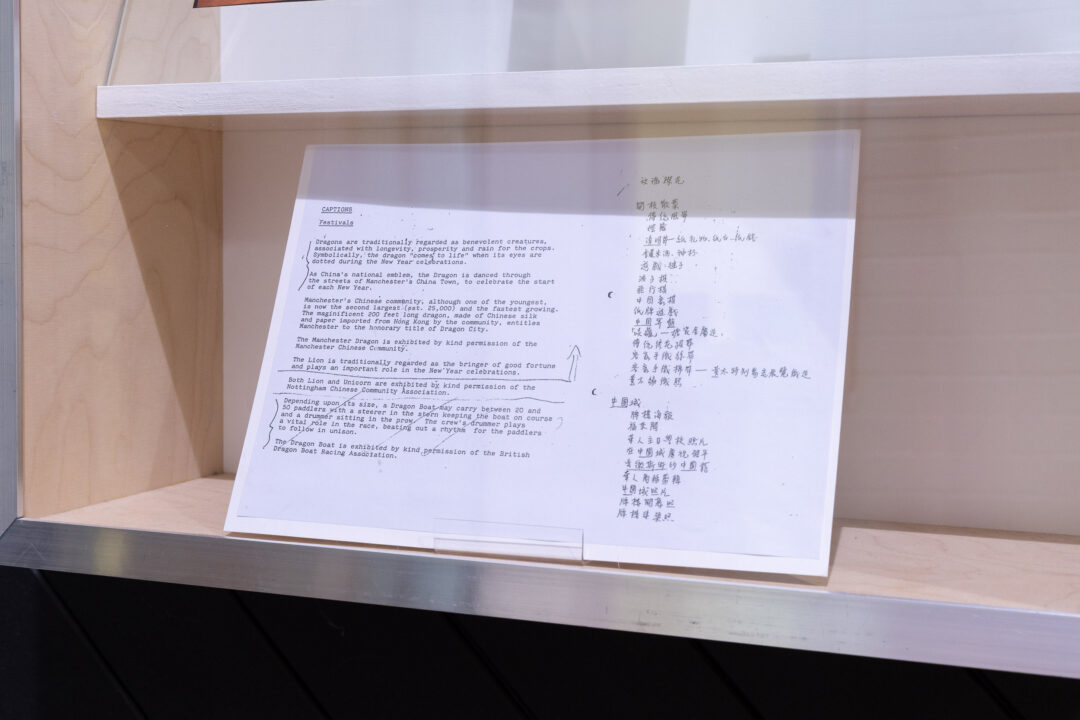
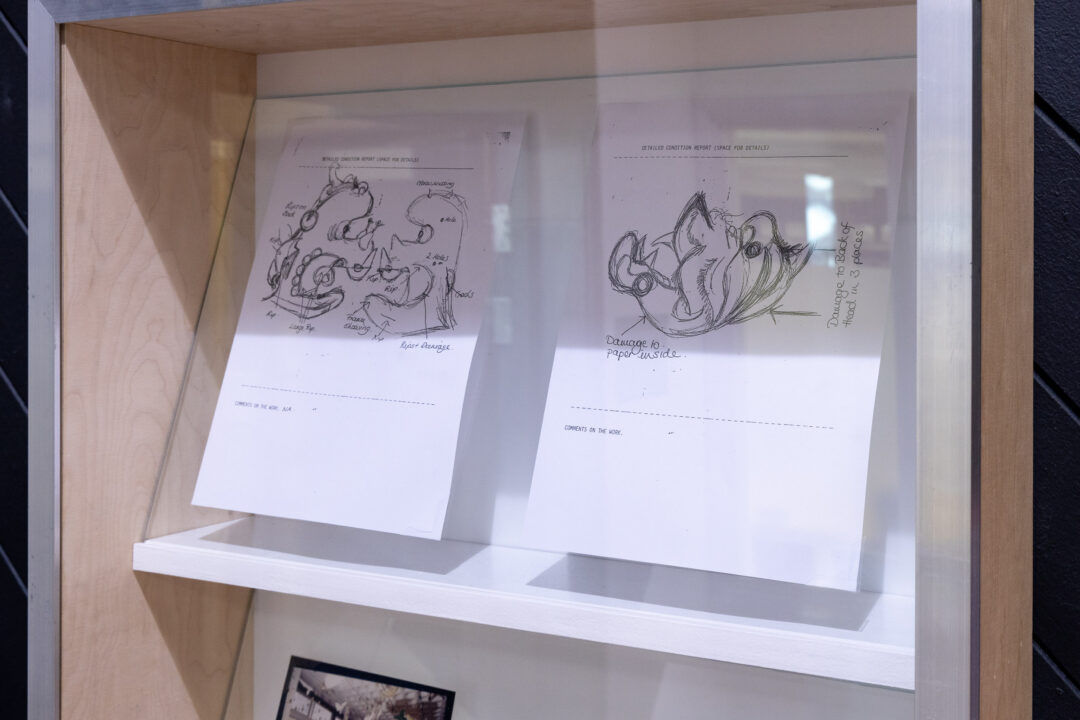
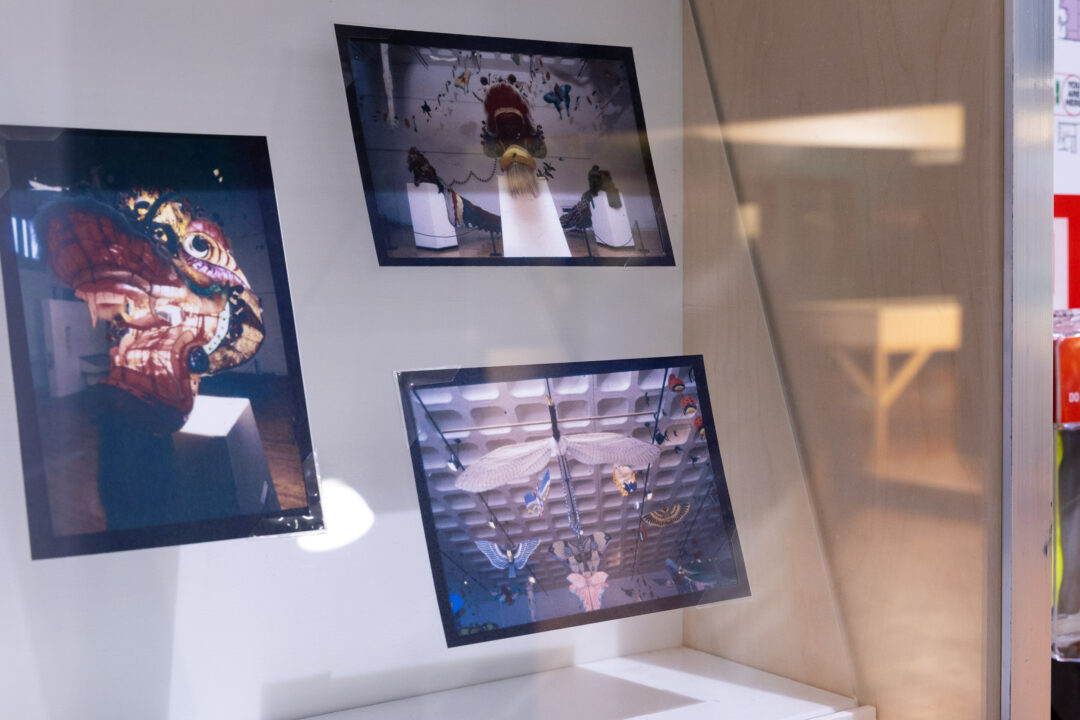
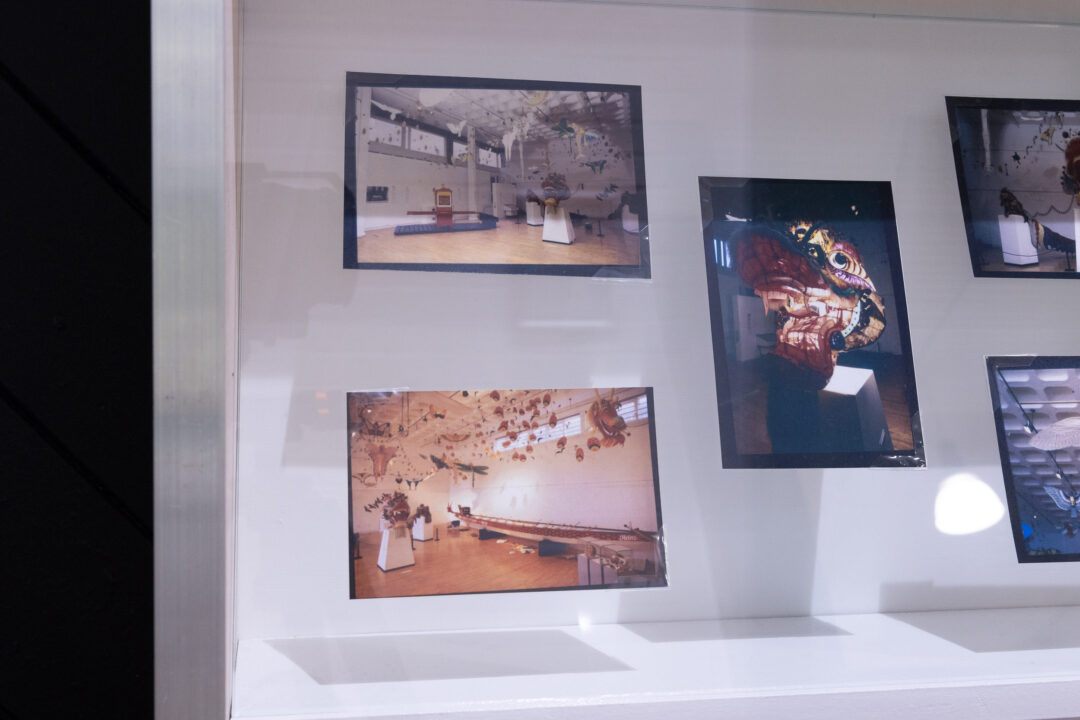
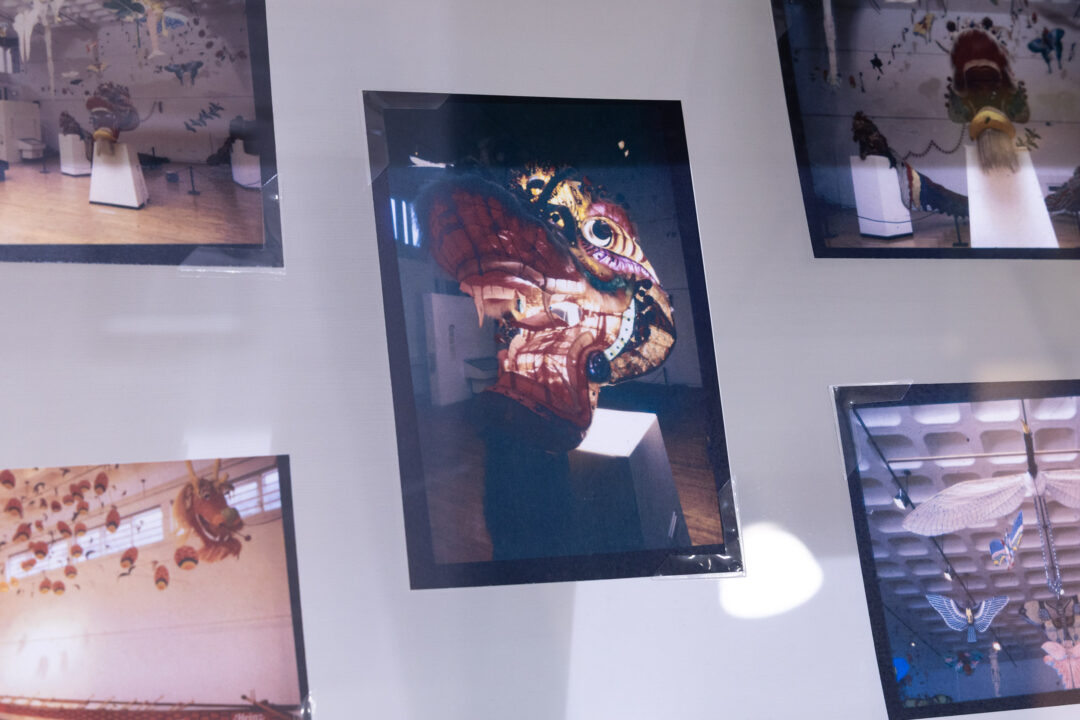
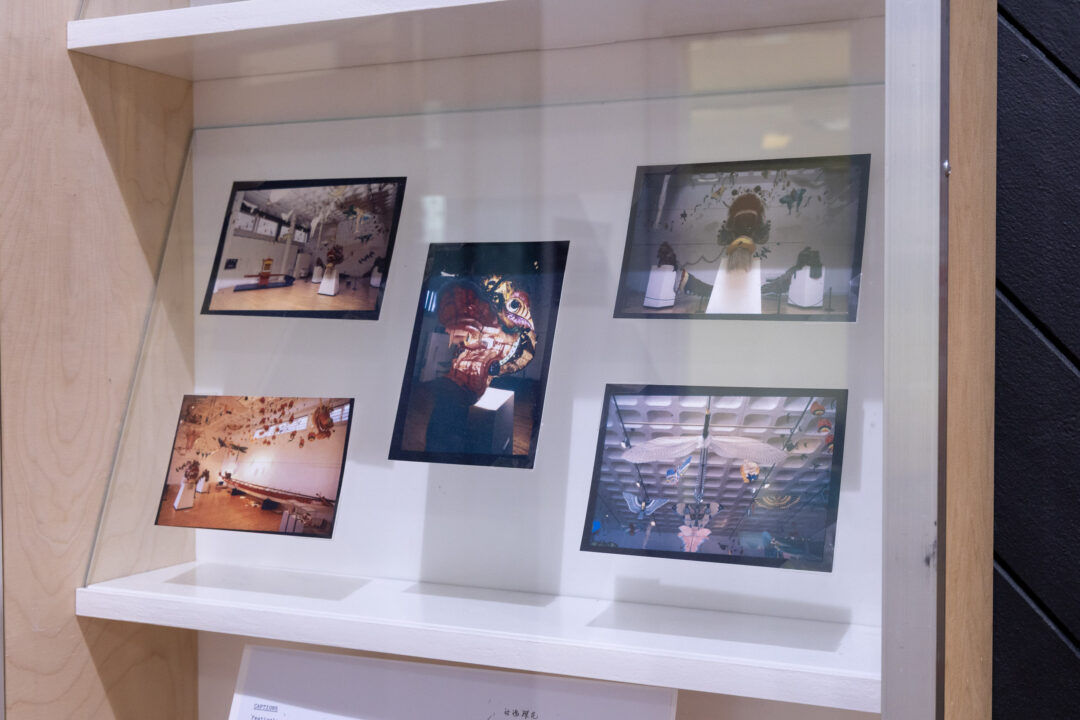
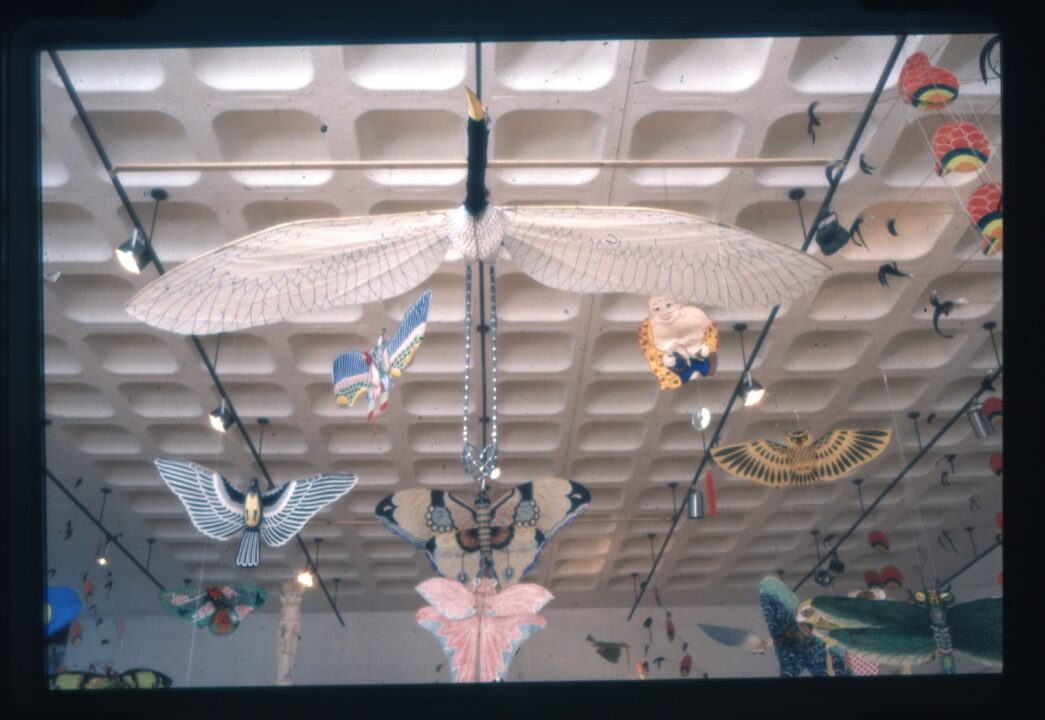
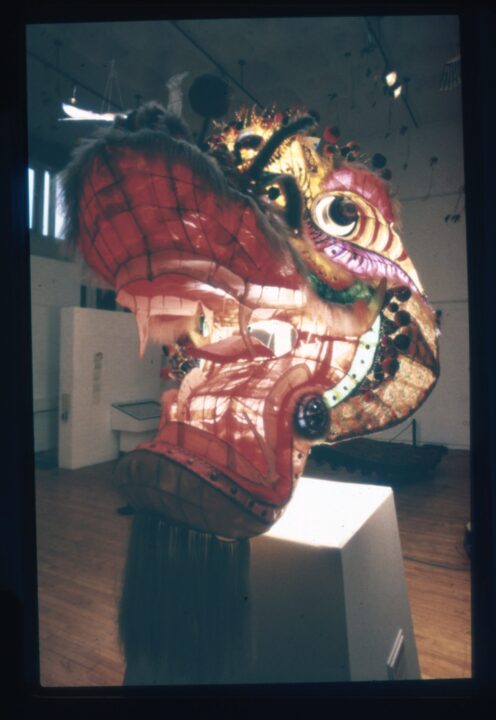
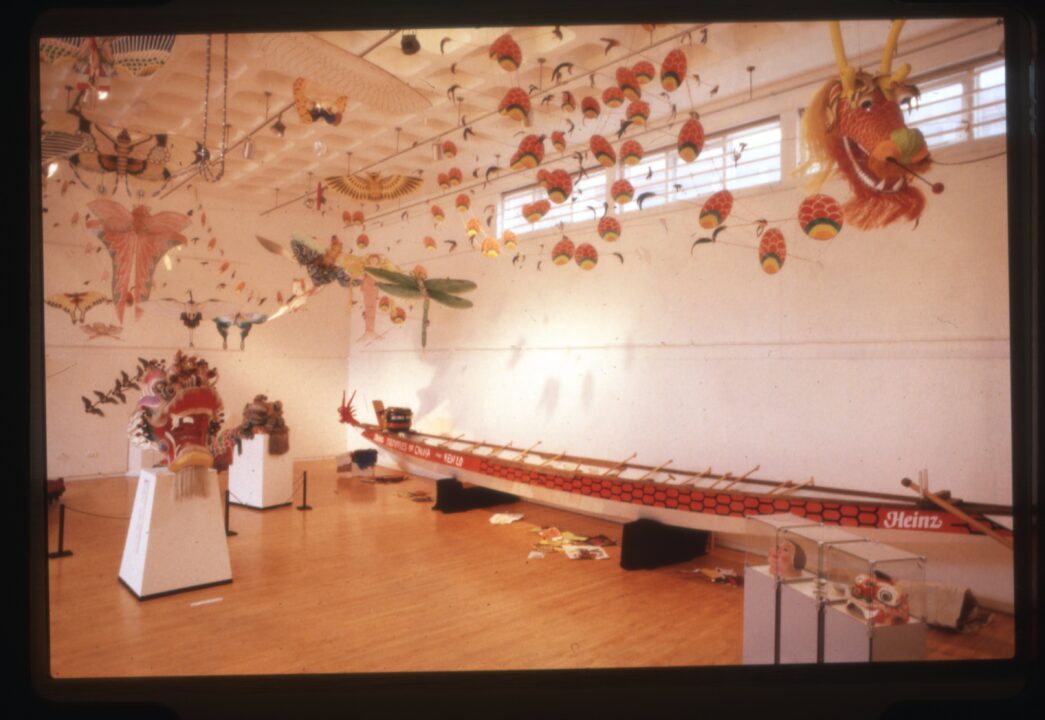
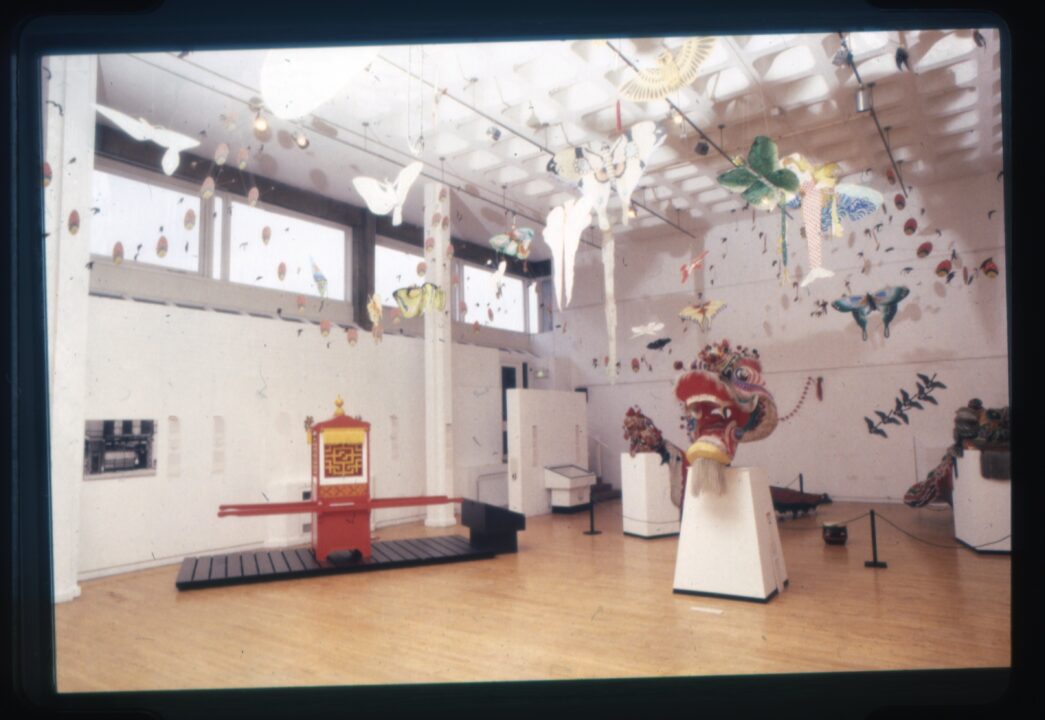
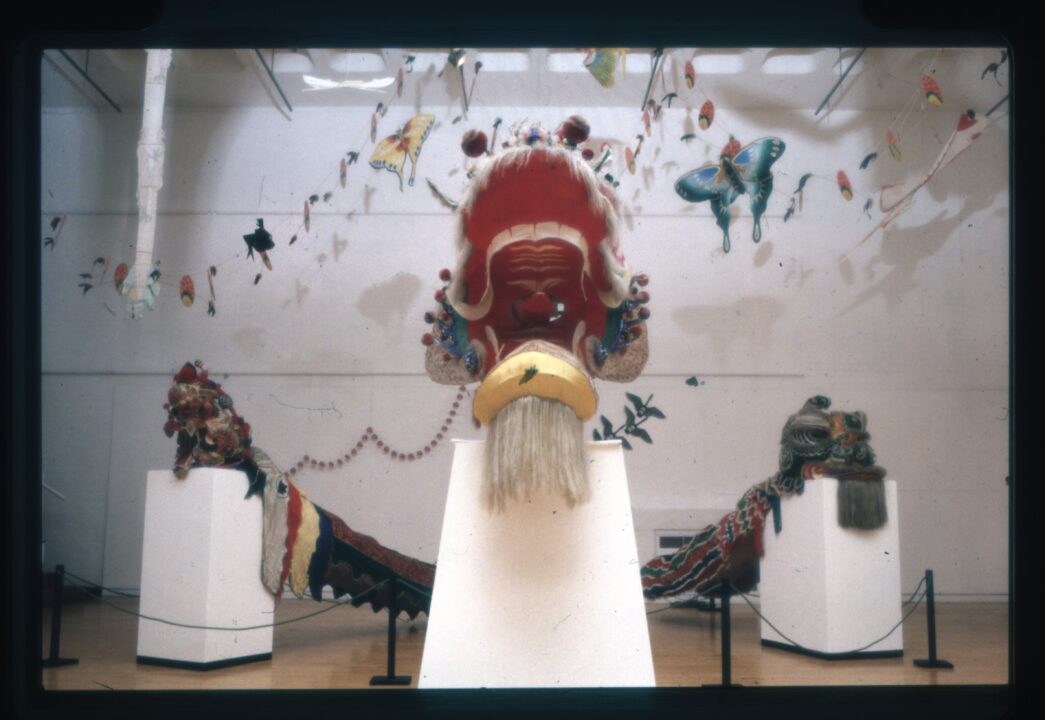
This event will be live-streamed on YouTube, Wednesday 16th April, 7-8.30pm, you can RSVP here.
Join us for a free online conversation event between multidisciplinary artist Aziza Kadyri, and Francesca Stocco, PhD researcher of textile art at Nottingham Trent University.
The talk will explore Aziza’s contemporary art practice, which blends the Central Asian tradition of suzani embroidery with AI technology. Combining physical stitching with digital tools, she reformulates suzani motifs and infuses them with personal and current socio-political narratives.
Together, the speakers will discuss the evolving meaning of textile craft in Aziza’s practice and in the context of Uzbekistan’s ongoing cultural transformation. Aziza has represented Uzbekistan at the 2024 Venice Art Biennial, along with the Qizlar collective and suzani master Madina Kasimbaeva. Set within a deconstructed theatre backstage, the exhibition explored migration, identity, and belonging through the lived experiences of Central Asian women. Through her collective and multi-media practice, Aziza challenges the Euro-centric division between craft and the fine arts, while also questioning the notion of single authorship in artistic production.
This event is part of Formations, Bonington Gallery’s ongoing events programme that is delivered in partnership with the Postcolonial and Global Studies Research Group.
To watch the live stream via YouTube, click here
Aziza Kadyri is a multidisciplinary artist focusing on experimental costumes, textiles, performance practices, and immersive technology. Her work has been showcased at the Uzbekistan National Pavilion at the 60th Venice Biennale, Pushkin House (London), Fondazione Elpis (Milan), and KINDL – Centre for Contemporary Art (Berlin). This year, she will participate in the first edition of the Bukhara Biennial, collaborating with suzani master Yulduz Mukhiddinova, and the 5th Hangzhou Triennial of Fibre Art.
Francesca Stocco is a PhD researcher at Nottingham Trent University. Her research specialises on the sociology of the art market and focuses on the resurgence of textile art in the twenty-first century. On the side, she runs the editorial and design project Filanda n.18 that explores textiles’ cultural narratives.
Join us for a free guided tour of Bonington Gallery’s latest exhibition with BSL interpretation.
Book your free place and enjoy a tour of Bonington Gallery’s third exhibition of the season, Weird Hope Engines curated by David Blandy, Rebecca Edwards and Jamie Sutcliffe, led by the Gallery’s Director Tom Godfrey.
Along with an introduction to the exhibition, Tom will talk through the accompanying Vitrines exhibition Nottingham Subcultural Fashion in the 1980s.
This event will last up to an hour. Please meet inside Bonington Building in the foyer space outside the Gallery doors at 12.55 pm. Free and open to all, booking required.
Organised by Neeraj Bunkar, a PhD student in the School of Arts and Humanities at Nottingham Trent University, The Dalit and Adivasi Film Festival (DAFF) 2025 is a platform to showcase dynamic and transformative works in visual culture created by Dalit and Adivasi filmmakers. These communities have a significant tradition of storytelling, yet their voices are often marginalised or overlooked in mainstream film circuits. DAFF seeks to amplify their narratives, perspectives, and creative expressions by bringing their work to a broader audience.
More than just a celebration of cinema, DAFF 2025 aims to foster critical engagement and dialogue. The festival will present a curated selection of twelve films, including documentaries, short films, and docu-fictions, all crafted by Dalit and Adivasi filmmakers. Each screening will be followed by interactive discussions with the filmmakers, providing an opportunity for audiences to engage with the socio-political realities explored in their work.
We dedicate DAFF 2025 to the memory of P. K. Rosy, the first actress of Malayalam cinema and a pioneering figure in the industry.
The festival will feature five sessions, commencing with the acclaimed film Swapnaayanam, directed by K.O. Akhil, the signature film of the 2024 International Film Festival of Kerala. This not only pays tribute to P. K. Rosy as a trailblazer in Malayalam cinema but also highlights the historical contributions of the working class in shaping the cinematic landscape.
Join us in celebrating cinema that amplifies marginalized voices and honours the enduring legacies of Dalit and Adivasi communities.
All screenings and discussions are online and can be accessed via the links below.
Neeraj Bunkar is a PhD scholar at the School of Arts and Humanities, Nottingham Trent University, United Kingdom. His research focuses on caste, Dalit identity, Rajasthani folklore, oral history, and cinema, with a particular emphasis on Rajasthan-based Hindi cinema from his standpoint as a Ambedkarite. His writings include the article “Spring Thunder: Adivasi Resistance for ‘Jal, Jangal, Jameen’” (2022) in the PostScript section and the book review “Subalternity at the Centre: A Young Diary Demands Radical Change” (2024), both published in Economic and Political Weekly. He also contributes regularly to platforms such as Forward Press and RoundTable India.
Pratik Parmar is an anti-caste filmmaker from Gujarat, renowned for his compelling narratives on Dalit dissent, deeply rooted in the heartlands of his home state. Since 2014, Pratik has been dedicated to filmmaking, shedding light on the often-overlooked stories of resistance and resilience within marginalized communities. His work amplifies ongoing struggles that are frequently ignored by mainstream media and cinema.
Prashant More is a filmmaker from a Dalit family and a first-generation learner. He graduated in Direction from the Film and Television Institute of India (FTII), Pune, where he honed his craft. His work has been showcased at several film festivals, including the Mumbai International Film Festival (MIFF), Bangalore International Film Festival, and the Indian Film Festival of Stuttgart, Germany. His feature screenplay was selected for the Writers Ink Feature Film Screenplay Writing Lab 2024-25. Based in Mumbai, Prashant explores themes of identity, caste, social issues, and human experience, aiming to bring diverse perspectives to the screen for both local and global audiences.
Palani Kumar, hailing from Jawaharlal Puram in Madurai, pursued engineering to fulfill his mother’s wish but found his passion in photography. While still a student, he took a loan to buy his first camera and later worked as a cinematographer for Kakoos, a documentary on manual scavengers in Tamil Nadu. His first photography exhibition, Naanum Oru Kullanthai, highlighted the lives of manual scavengers’ children. Since 2019, as a fellow of the People’s Archive of Rural India (PARI), he has been documenting the lives of working-class women across India. He is also part of Pep Collective, a forum for socially responsible photographers. Recognized as one of Anandha Vikatan’s ‘Top Ten Humans 2019,’ he has received multiple accolades, including the Dayanita Singh-PARI Documentary Photography Award (2022). Kumar’s work was recently featured at the Primary Gallery in Nottingham, where he was invited to discuss his personal journey and projects addressing issues such as manual scavenging, “honour killings”, and the systemic exploitation of working-class and Dalit communities. Through his photography, he continues to amplify the voices of marginalized communities.
K.O. Akhil is an independent writer, director and cinematographer based in Mumbai. He holds a master’s degree in Cinematography from the prestigious Film and Television Institute of India (FTII), Pune (2018 batch), and has also studied at KRNNIVSA, Kerala. His artistic journey began at the National Institute of Fashion Technology (NIFT), New Delhi, where he graduated with honours in Communication Design. His talent for visual storytelling emerged early in his career when his graduation project, a hybrid short film titled Incarnate Deity, which explores the mystical Theyyam ritual of Kerala, earned him the Best Communication Design Project Award in 2016 at NIFT Delhi.
Oneiric Odyssey (1 min, Swapnaayanam) traces the origins of Malayalam cinema, from the historic announcement of the first screening of Vigathakumaran (The Lost Child) in a rural village to the emergence of a new theatre in the city of Trivandrum. Through the courageous legacy of P.K. Rosy, Malayalam cinema’s first actress, and the struggles of the working class, the film crescendos with the unveiling of Lanka Lakshmi – the iconic symbol of IFFK, representing unity, cultural diversity, and the enduring strength of cinema.
Udmashan, a short film directed by Prashant More (5 mins, English), is a psychological thriller about a young writer chasing a lead on a rainy night who stumbles into a surreal nightmare in a decaying chawl. Strange figures blur reality, plunging her into darkness and madness. Truth or ruin—what awaits?
Ranjis, a short film directed by Prashant More (15 mins, Ahirani & Marathi): In rural India, 10-year-old Manoj endures caste oppression and family turmoil. His scavenger father’s rage and society’s cruelty push him to the edge. A discarded object becomes his escape—until a final, explosive act of defiance changes everything.
Project Heartland, a documentary directed by Pratik Parmar (44 Mins, Gujarati), captures the struggles of people from marginalized communities, primarily Dalits in Gujarat. It highlights the courage and determination of Dalit women and men as they assert their rights despite overwhelming odds. By documenting these stories of resilience, Project Heartland seeks to ensure that these brave individuals are known, recognized, and serve as an inspiration to others.
Shohini Barman is a doctoral candidate in the School of Arts and Humanities at Nottingham Trent University. She completed her BA and MA at Jadavpur University, Kolkata, India. Her PhD research focuses on Dalit literature in Bengal.
Lipika Singh Darai is an Indian filmmaker, editor, and sound recordist from Odisha. She graduated from the Film and Television Institute of India (FTII) in 2010, specializing in sound recording and design. Belonging to the Ho indigenous community, Darai has focused her work on socio-cultural themes, particularly those related to Odisha. Throughout her career, Darai has received four National Film Awards in the non-feature section for direction, sound recording, and narration. Her debut film, A Tree a Man a Sea (2012), earned her the Best Debut Film of a Director award. She continued to explore pressing social issues in her subsequent works, such as Some Stories Around Witches (2015), which delves into the humanitarian crisis of witch-hunts in Odisha, and The Waterfall (2017), a short fiction film highlighting the struggle to protect a dying waterfall. In 2023, Darai’s documentary Night and Fear premiered at the International Film Festival Rotterdam in the Ammodo Tiger Short competition. She is currently developing her debut fiction feature, Birdwoman, which has received support from the Hubert Bals Development Fund. Additionally, she was recognized as one of the ten creative talents in BAFTA Breakthrough India 2023. Darai’s work is deeply rooted in the cultural and social landscapes of Odisha, reflecting her commitment to bringing regional stories to a broader audience. Her films often explore themes of social justice, cultural heritage, and the resilience of marginalized communities.
Seral Murmu is a filmmaker who graduated from the prestigious Film and Television Institute of India, Pune. His films focus on tribal issues, identity, and the struggle for equality and justice. Through his work, he aims to strengthen the tribal resistance movements taking place across different parts of India. Belonging to the Santhal tribe, Seral Murmu was born and raised in Ghatshila, a small town on the banks of the Subarnarekha River. He began his journey in filmmaking by assisting documentary filmmakers while pursuing an undergraduate degree in Mass Communications at St. Xavier’s College, Ranchi, Jharkhand. During this time, he closely observed the power of cinema as a medium for change, which inspired him to become a filmmaker and share his own stories with the world. Ranchi has been an epicentre for tribal activists fighting for their rights and justice. Murmu became closely associated with these activists, collaborating with them and creating documentaries to amplify the voices of the unheard. As a cinematographer and editor, he has contributed to the making of eight documentaries and short fiction films. His short films Rawaah and Sondhayni have been screened and received awards at both national and international film festivals. He is currently working on a feature-length documentary about the history of Santhali cinema. Additionally, he has been commissioned to make two documentaries for the Ramdayal Munda Tribal Research Institute in Ranchi and is developing a feature-length Santali film. Murmu has a deep interest in tribal folklore, myths, arts, and folk songs, all of which serve as the foundation of his storytelling.
Mrigakshi Das hailing from Odisha, India, is a doctoral candidate at the School of Arts and Humanities, Nottingham Trent University, UK. She holds both a Master’s and a Bachelor’s degree in English from the University of Delhi, India. Her current research focuses on Adivasi literature, and her thesis is titled “Adivasi Literature and Cinema: Exploring Adivasi Alterity and Assertion”. Her areas of interest include Dalit literature, Adivasi literature, and decolonial and postcolonial studies.
Dr Nicole Thiara is Co-lead of Nottingham Trent University’s Postcolonial and Global Studies Research Group and Principal Investigator on the AHRC-funded Research Network Series ‘Writing, Analysing, Translating Dalit Literature’ and its Follow-on Grant ‘On Page and on Stage: Celebrating Dalit and Adivasi Literatures and Performing Arts’. She teaches postcolonial and contemporary literature at Nottingham Trent University, UK. Her area of research is Dalit and South Asian literature, and her current research project is the representation of modernity in Dalit literature.
Dr Judith Misrahi-Barak is a Professor of Postcolonial Studies at Université Paul Valéry Montpellier 3, France, specializing in Caribbean, Indo- and Sino-Caribbean literatures, diaspora, and migrant writing. She has published widely, contributing to volumes such as Tracing the New Indian Diaspora (2014), Turning Tides (2019), and Windrush (1948) and Rivers of Blood (1968): Legacy and Assessment (2019). She is the General Editor of the PoCoPages series (Borders and Ecotones in the Indian Ocean, 2020). Her latest works include chapters on Edwidge Danticat (Bloomsbury Handbook, 2021), Sino-Caribbean literature (Caribbean Quarterly, 2021), and Kala Pani Crossings (co-edited, 2021). Her monograph, Entre Atlantique et océan Indien: les voix de la Caraïbe anglophone, was published in 2021. Her recent research explores Dalit literatures, having co-led AHRC projects on Dalit and Adivasi literature and performance (2014–23). She co-edited The Routledge Companion to Caste in Cinema in India (2022).
The Waterfall (21 mins, 2017, English) traces the evolution of a young city boy, Karun, to appreciate the value of the environment as well as think critically about climate change and development. On a trip to his ancestral home in the interiors of the state of Orissa in India, he reflects on the nature of his relationship with a beautiful landscape and its relationship in turn with his city life.
Sasandiri (40 mins, Mundari and Hindi) tells the story of the tribal rights movement in Jharkhand, following the work and struggles of prominent tribal activists from within the community. The title Sasandiri refers to a tombstone, which also serves as a landholding marker and record for the tribals. The film delves into the lives of these activists as they fight for their community’s rights, highlighting their struggles, challenges, and triumphs. It explores the complexities of advocating for land and cultural heritage, offering a glimpse into the history and significance of the tribal rights movement in Jharkhand.
Anjitha V P is a passionate filmmaker and writer from Kerala with an academic and professional background in cinema. She holds a BA from Maharaja’s College, Ernakulam, and an MA from the University of Hyderabad. Anjitha has worked as a Process Associate at Genpact, Hyderabad, but her true calling lies in filmmaking. She has served as an Assistant Director in films like Pumpkin (short film directed by Meccartin) and Divorce (KSFDC-funded feature film directed by Mini IG). She also contributed as an Assistant Scriptwriter for the Malayalam film Nizhalazham (2022) directed by Rahul Raj. As a filmmaker, Anjitha wrote and directed the Malayalam short film Vyadhi, which received critical acclaim and multiple awards, including Best Short Film at KIFF – Kalinga 2023, Special Jury Mention at MediaOne Academy Film Festival 2023, and Best Screenplay at Kayal Sammelanam Short Film Festival 2023. Her journey in cinema reflects a deep commitment to storytelling and an evolving creative vision.
Rocky Mol Selvaraj is a South Indian visual artist originally from Pudukkottai and based in Nottingham. Her practice encompasses painting and photography, exploring her Dalit identity and personal experiences through various notions of skin. After earning an MA in Fine Arts from the University of Lincoln, she continues to examine skin and identity while dreaming beyond, incorporating surrealistic metaphors. For her, apples represent everything—her deepest fears, desires, hopes, the idea of love, family, home, beauty, equality—everything real and imaginary. Her works have been exhibited in various galleries across the East Midlands and are currently part of the exhibition Kolam at Primary, Nottingham. To read more about the artist’s practice, visit: Apples and People – Skin
Kalpana Ambedkar is a passionate filmmaker and multimedia professional with over five years of experience in filmmaking, video production, and programme organizing. With a strong commitment to social justice, her work focuses on thought-provoking narratives addressing caste, gender, and Dalit issues in Indian society. She holds a Master’s in business management (Finance) and a Bachelor of Arts in Economics from NMCC, Marthandam. Beyond filmmaking, she pursues creative writing, curating talent, and event planning. Kalpana has directed the music video Thodaatha, produced by Bigson Records and released by Sony Music South. She is also an Assistant Director on Thandakaaranyam, a socio-political film by Athiyan Aathirai under Neelam Productions. As an Executive Producer, she collaborates with Arivu & The Ambassa, a Chennai-based multi-genre music band that amplifies voices for social justice. Previously, she played a key role in organizing Margazhiyil Makkalisai, a ten-day music festival by Neelam Cultural Centre and filmmaker Pa. Ranjith. With a deep passion for storytelling that challenges social norms, Kalpana continues to push boundaries in Indian cinema, using art as a tool for awareness and change.
Neeraj Bunkar is a PhD scholar at the School of Arts and Humanities, Nottingham Trent University, United Kingdom. His research focuses on caste, Dalit identity, Rajasthani folklore, oral history, and cinema, with a particular emphasis on Rajasthan-based Hindi cinema from a Dalit standpoint. His writings include the article “Spring Thunder: Adivasi Resistance for ‘Jal, Jangal, Jameen’” (2022) in the PostScript section and the book review “Subalternity at the Centre: A Young Diary Demands Radical Change” (2024), both published in Economic and Political Weekly. He also contributes regularly to platforms such as Forward Press and RoundTable India.
The short film Vyadhi(7 mins, Malayalam) by Anjitha V. P. follows two ladies who meet at a common service centre and become friends. However, as their conversation begins, everything starts to change.
The short film Break The Silence (40 mins, Tamil) is directed by Kalpana Ambedkar. In the deafening roar of textile machines, where sweat and suffering are woven into every thread, silence is the price of survival. Behind locked gates, countless young women endure unspeakable abuse—trapped, unheard, and forgotten. Break The Silence exposes the brutal realities of gender-based violence within these factories, where power preys on the helpless and fear keeps lips sealed. But one woman refuses to be another nameless victim. After enduring relentless torment, she runs—fleeing through the shadows, leaving behind friends who weren’t as lucky. With nothing but fear in her chest and the fire of survival in her heart, she fights her way home. Villagers become her shield, guiding her to safety. But the scars of her past refuse to fade. This time, she’s not running. She’s returning—not alone but armed with justice. With the help of a social worker, she storms the very place that once broke her. Twenty-five girls. Twenty-five stolen lives. Today, they walk free. This is not just a story of escape. It’s a story of uprising, of defiance—of breaking the silence, forever.
Neeraj Bunkar is a PhD scholar at the School of Arts and Humanities, Nottingham Trent University, United Kingdom. His research focuses on caste, Dalit identity, Rajasthani folklore, oral history, and cinema, with a particular emphasis on Rajasthan-based Hindi cinema from a Dalit standpoint. His writings include the article “Spring Thunder: Adivasi Resistance for ‘Jal, Jangal, Jameen’” (2022) in the PostScript section and the book review “Subalternity at the Centre: A Young Diary Demands Radical Change” (2024), both published in Economic and Political Weekly. He also contributes regularly to platforms such as Forward Press and RoundTable India.
Rupal Bansal is a Ph.D. candidate in English Literature at Nottingham Trent University, UK. Her research interests lie at the intersection of Night Studies, Partition Studies, and Violence, Trauma, and Memory Studies. Focusing on the phenomenological experiences of the night, her dissertation examines how acts of violence, migration, and remembering are structured within the ‘chronotope’ of the night in narratives about the Partition of India in 1947.
Purnachandra Naik is a researcher specializing in Dalit literature. He completed his PhD at NTU and is the author of the forthcoming Routledge book Reading the Rejected: Dirt in Dalit Literature. His research explores caste, marginality, and literary expressions of resistance. Naik has contributed extensively to journals and edited volumes, examining various aspects of Dalit narratives across literature and cinema. His works published in Economic and Political Weekly include Baby Kamble to Bama: Dalit Women Write Differently, “Baluta” and “Joothan” amid Humiliation, Sparks of Life amid the Dead, Roars of Dalit Audacity, and A New Note to the Polyphony. His book chapter Screening Caste: ‘Untouchable’ Body, Labour, and Remuneration in Lagaan appears in The Routledge Companion to Caste and Cinema in India (2022). He has also published The Luminous Voice of an Enslaved Character in Outlook (2024), Contemporary Shades of Kerala and Many Idioms of Caste and Untouchability in The Book Review. Additionally, his book chapter Studying Caste Up: Yashica Dutt’s Coming Out as Dalit is part of Subalternities in India and Latin America (2021). His scholarship critically engages with caste, humiliation, and assertion in Dalit narratives, offering nuanced insights into their literary and cinematic representations.
Soumik Hazra is currently pursuing his PhD, titled “In Search of the Decentred Other: Post-Millennium Hindi Crime Cinema and Its Expanded Terrains”, at the Cinema Studies Department, School of Arts and Aesthetics, Jawaharlal Nehru University, New Delhi, India. He identifies as a cinephile with an avid interest in new media studies, film philosophy, genre studies, popular culture, and documentary cinema. His work has been published in the journal Widescreen.
Ajay Pateer is a filmmaker and a PhD candidate in Cinema Studies at the School of Arts and Aesthetics, Jawaharlal Nehru University, New Delhi. As a researcher, his current focus lies in cyberactivism and the anti-caste movement. As a filmmaker, he is working in the documentary form.
Red Brick Battleground, a documentary film by Ajay Pateer and Soumik Hazra (125 mins, Hindi) documents the 2024 JNU Students’ Union election, student movements post-2016, and state-backed violence. Blending interviews, electoral coverage, and found footage, it captures JNU’s resilience and broader political realities.
Mahishaa is an Ambedkarite filmmaker based in Bangalore, whose work primarily focuses on urban Bengaluru. His films explore the intersections of caste, gender, and masculinity. He is the founder of Neelavarana, an Ambedkarite artist collective that produces short films, music videos, and documentaries centered on Bahujan stories, created by people from the DBA community. His works have been showcased internationally, including in Melbourne, Australia, Berlin, Germany, and other locations.
Dr Nicole Thiara is Co-lead of Nottingham Trent University’s Postcolonial and Global Studies Research Group and Principal Investigator on the AHRC-funded Research Network Series ‘Writing, Analysing, Translating Dalit Literature’ and its Follow-on Grant ‘On Page and on Stage: Celebrating Dalit and Adivasi Literatures and Performing Arts’. She teaches postcolonial and contemporary literature at Nottingham Trent University, UK. Her area of research is Dalit and South Asian literature, and her current research project is the representation of modernity in Dalit literature.
Chandrashekara K. is a versatile talent in Kannada theatre and cinema—an international actor, director, filmmaker, and pedagogue specializing in movement and devising. He has participated in several international theatre experiments, traveling to countries like Japan, Germany, Lebanon, South Africa, and Switzerland. Chandrashekara has played lead roles in Kannada films such as Gavisiddha and Mahasampark and has directed innovative plays like Keri Haadu and Panchamapada. He holds a postgraduate degree from the Department of Performing Arts at Bangalore University and is a founding member of Jangama Collective. Committed to building theatre movements with marginalized communities and sexual minorities, he is also preparing a collection of his stories for publication. His current performance in the play Bob Marley from Kodihalli has further enhanced the production’s impact.
Ampee Panyang is a filmmaker and screenwriter from Arunachal Pradesh, currently based in Mumbai, Maharashtra. She is a graduate of the prestigious Film and Television Institute of India (FTII), Pune, specializing in Direction and Screenplay Writing. In addition to her filmmaking career, she is a film professor associated with several renowned film institutes in Mumbai.
Neeraj Bunkar is a PhD scholar at the School of Arts and Humanities, Nottingham Trent University, United Kingdom. His research focuses on caste, Dalit identity, Rajasthani folklore, oral history, and cinema, with a particular emphasis on Rajasthan-based Hindi cinema from a Dalit standpoint. His writings include the article “Spring Thunder: Adivasi Resistance for ‘Jal, Jangal, Jameen’” (2022) in the PostScript section and the book review “Subalternity at the Centre: A Young Diary Demands Radical Change” (2024), both published in Economic and Political Weekly. He also contributes regularly to platforms such as Forward Press and RoundTable India.
Babasaheb In Bengaluru (5 min, Kannada) by Mahishaa is a short film that showcases Dr. B.R. Ambedkar’s statues in Bengaluru, which stand as powerful symbols of resistance and empowerment for marginalized communities. Unlike government-funded monuments, these statues exist through the people’s efforts, embodying his philosophy to “Educate, Agitate, Organise.” Each one tells a story of struggle, reminding millions to carry forward his vision of equality and justice.
Keri Haadu/Song Of Ghetto (33 min, Kannada)is a documentary film by Chandrashekara K. which documents the aftermath of a Dalit protest in Dindguru, Karnataka, sparked by caste discrimination. While their movement succeeded, the community now faces harsh consequences. The film captures their daily struggle, resilience, and survival as an act of resistance.
NON-AC (20:22 mins, Nepali and Hindi), directed by Ampee Panyang, is a short film that follows Maya and Jorge, immigrants from Nepal, as they struggle to make ends meet and survive in Pune, India. Often treated as outsiders, they grapple with the challenges of migration while finding solace in each other’s company. As their friendship deepens, it begins to take on a more profound meaning, rooted in the shared longing for a sense of ‘home.’ The film explores themes of migration, racism, xenophobia, and economic class differences that run deep in Indian society.
Book your free ticket and join us at Bonington Gallery for the Critical Hits Zine Fair.
Marking the launch of our next exhibition Weird Hope Engines (22 March – 10 May) this event celebrates DIY publishing and tabletop gaming with vendors from Nottingham and around the UK including Melsonian Arts Council, Copy/Paste Co-op, Warp Miniatures, Ramshackle Games and others. Critical Hits Zine Fair brings together independent publishers, artists, and writers exploring themes of critical worlding, resistance, and alternative futures.
Alongside a diverse range of zines and collectables to purchase, the Fair also features a programme of talks and conversations with artists from the exhibition including Zedeck Siew and Angela Washko, and panel discussions on fantasy illustration, game design and miniature fabrication with Andrew Walter, Amanda Lee Franck, Scrap World, and Alex Huntley.
Critical Hits Zine Fair also features gaming sessions with David Blandy, Angela Washko and Andrew Walter, as well as a film screening programme delving further into the narratives, aesthetics, and communities that shape these immersive worlds, including the documentaries World of Darkness (2017) and Eye of the Beholder: The Art of Dungeons & Dragons (2019).
Talks:
12:00 – 12:45
Drawing Down The Moon: The Art of TTRPG Illustration
Amanda Lee Franck and Scrap Princess
Chaired by Andrew Walter
13:00 – 13:45
Warped Worlds and Ramshackle Realms: Worlds In Miniature
Curtis Fell (Ramshackle Games) and Alex Huntley (Warp Miniatures)
Chaired by Chris MacDowell
14:00 – 14:45
Art Can Never Be Games!: What Is An Art Game?
Tom Kemp and Angela Washko
Chaired by Jamie Sutcliffe and Rebecca Edwards
15:00 – 15:45
Games Design For Planetary Survival
Chris Bissette, Laurie O’Connell and Zedeck Siew
Chaired by David Blandy
Game play sessions:
11.30am: David Blandy, Eco Mofos
2pm: Andrew Walter, Swyvers
3.30pm: Angela Washko, The Council is in Session
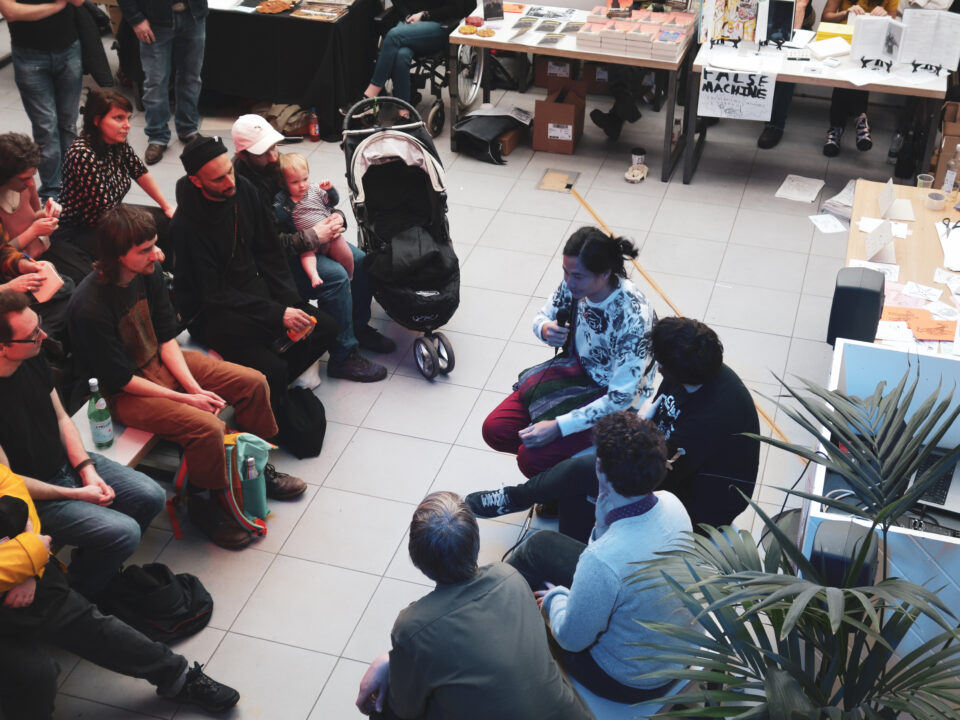
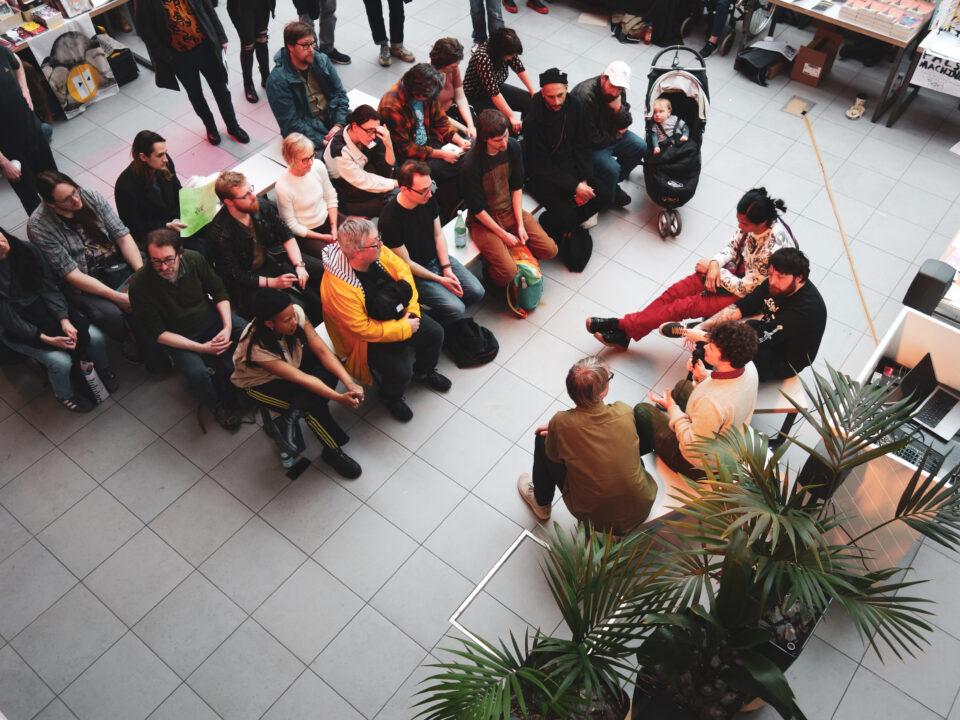
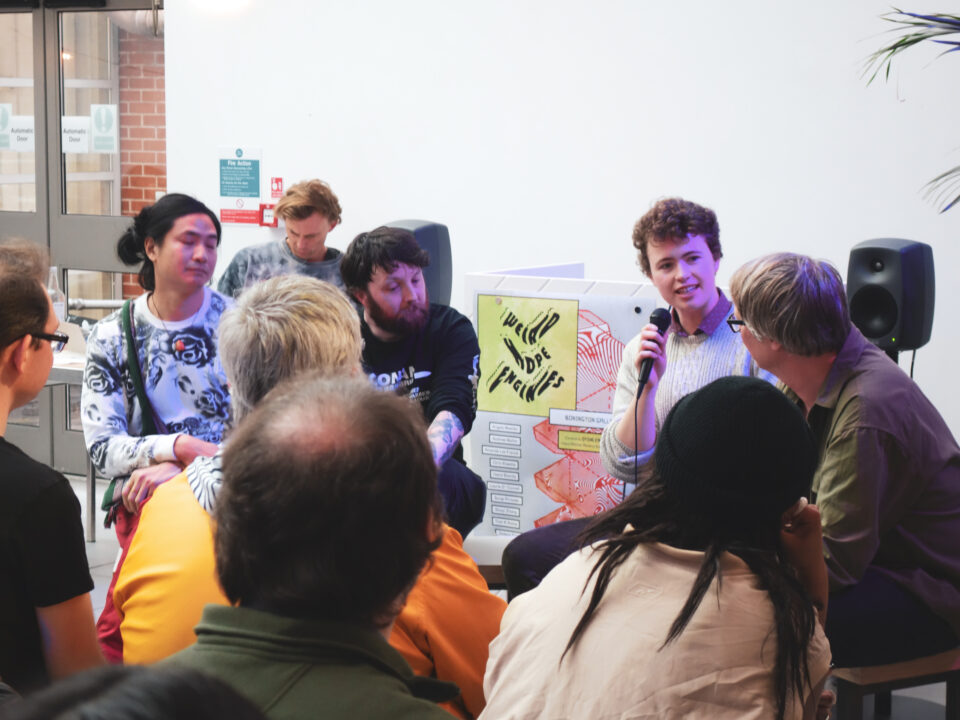
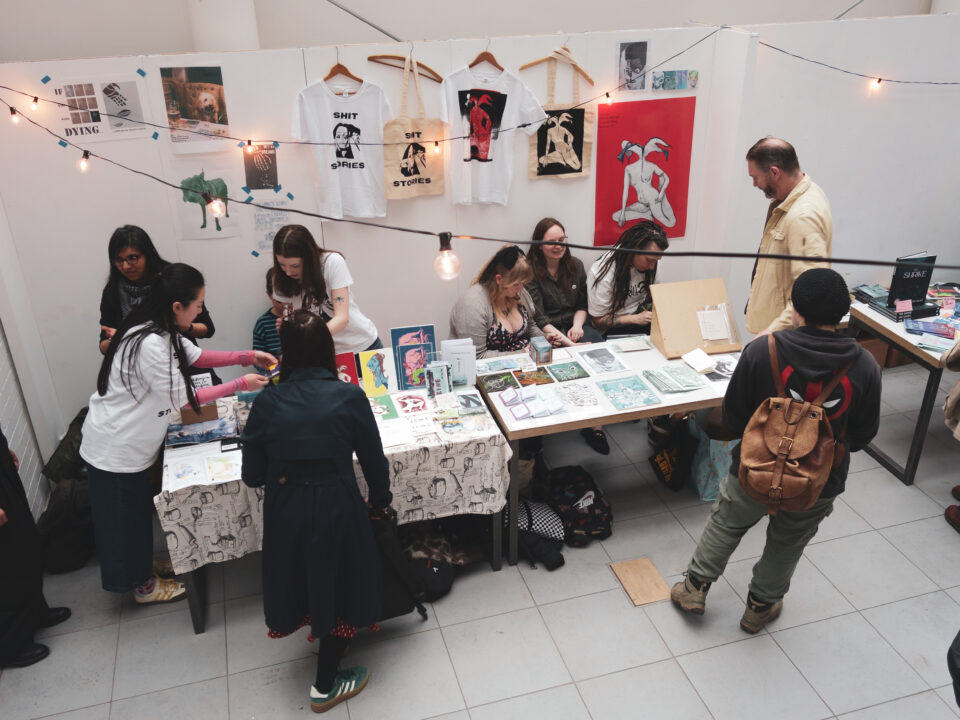
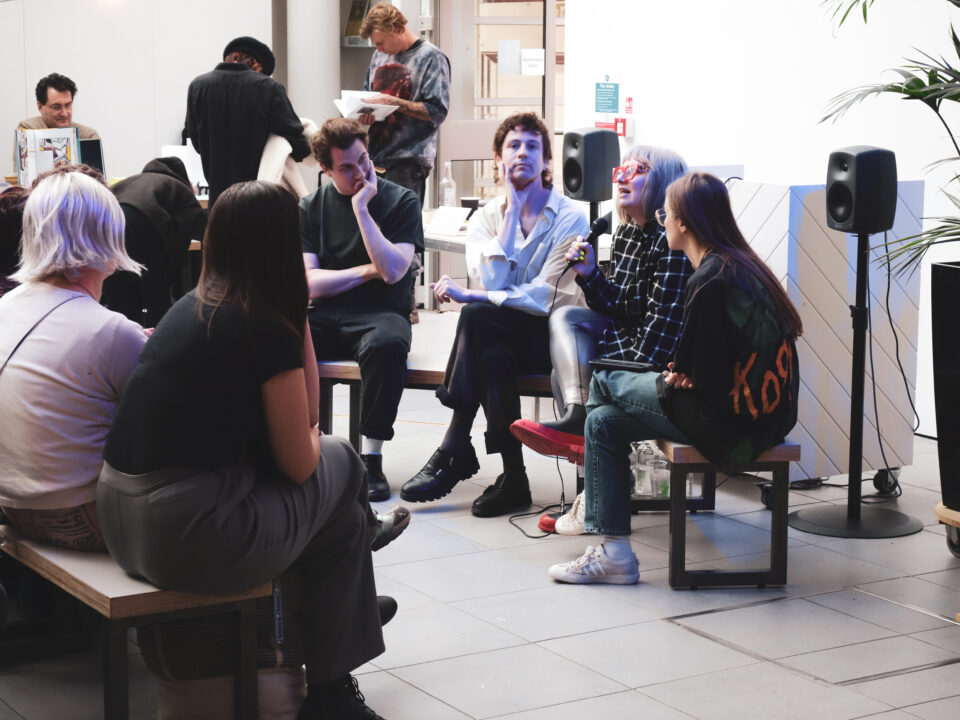
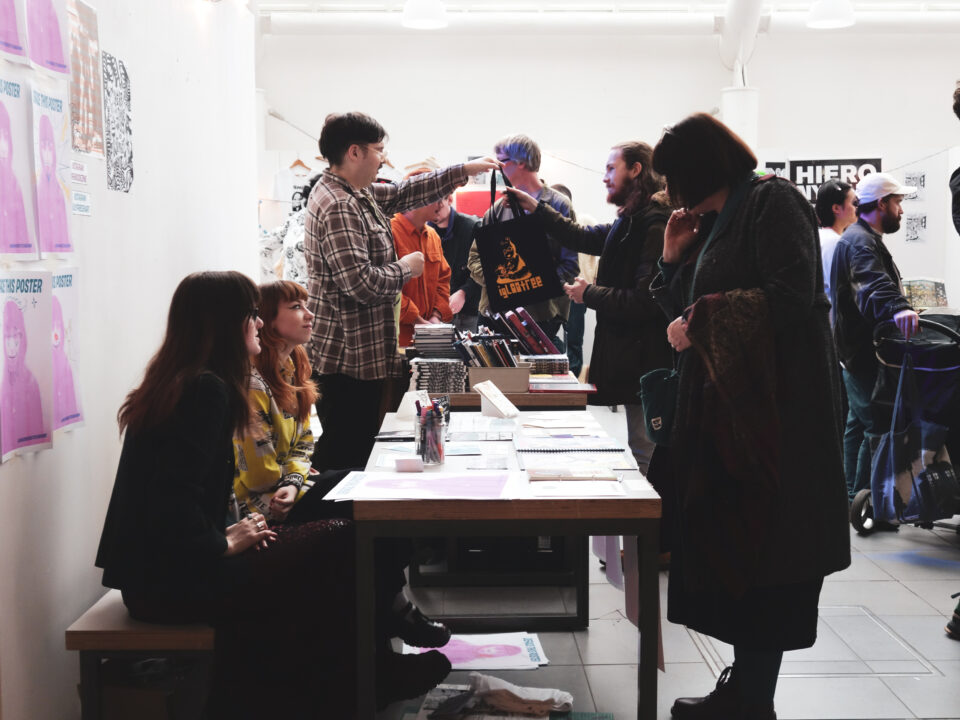
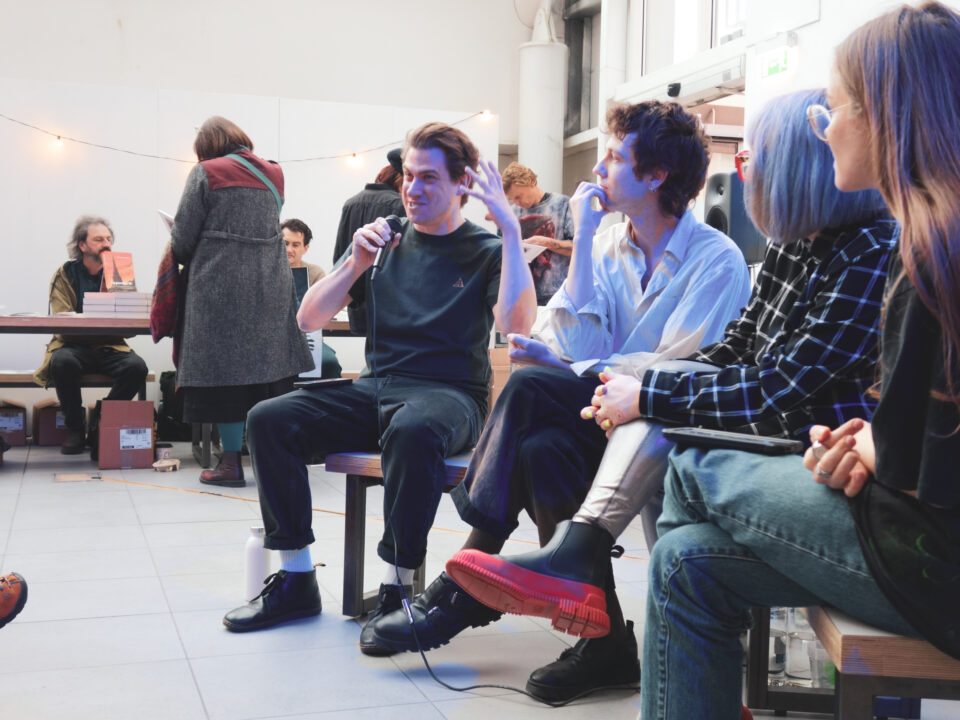
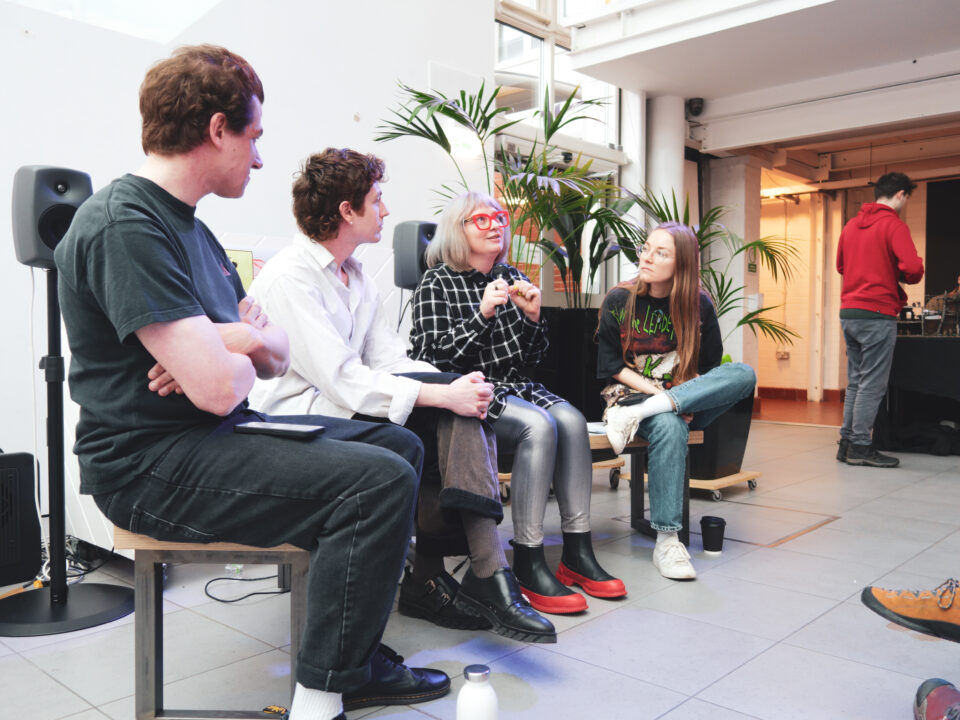
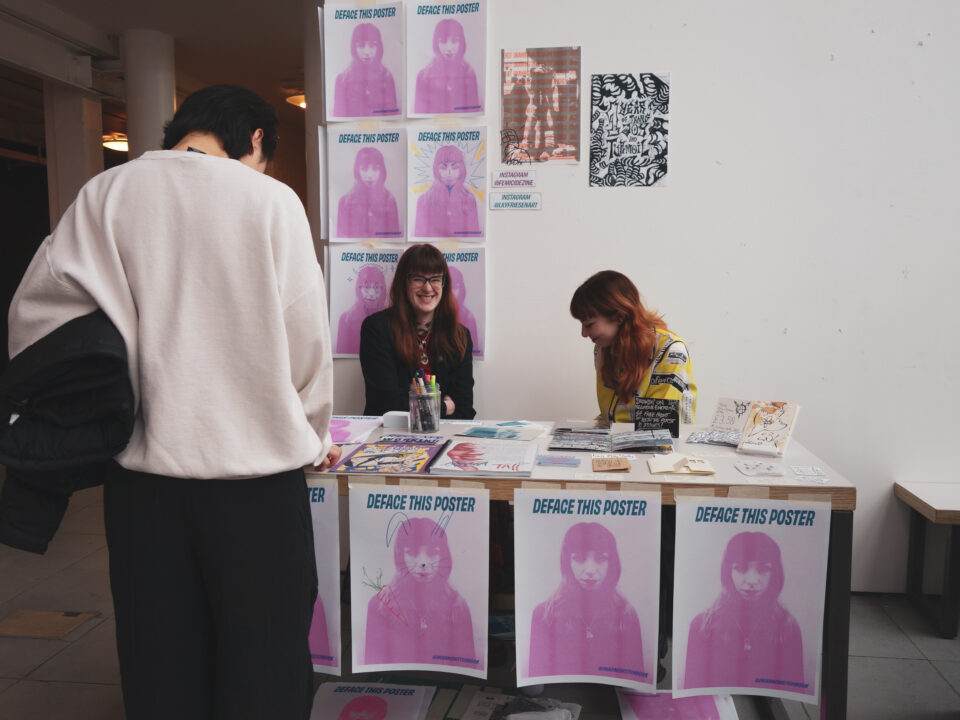
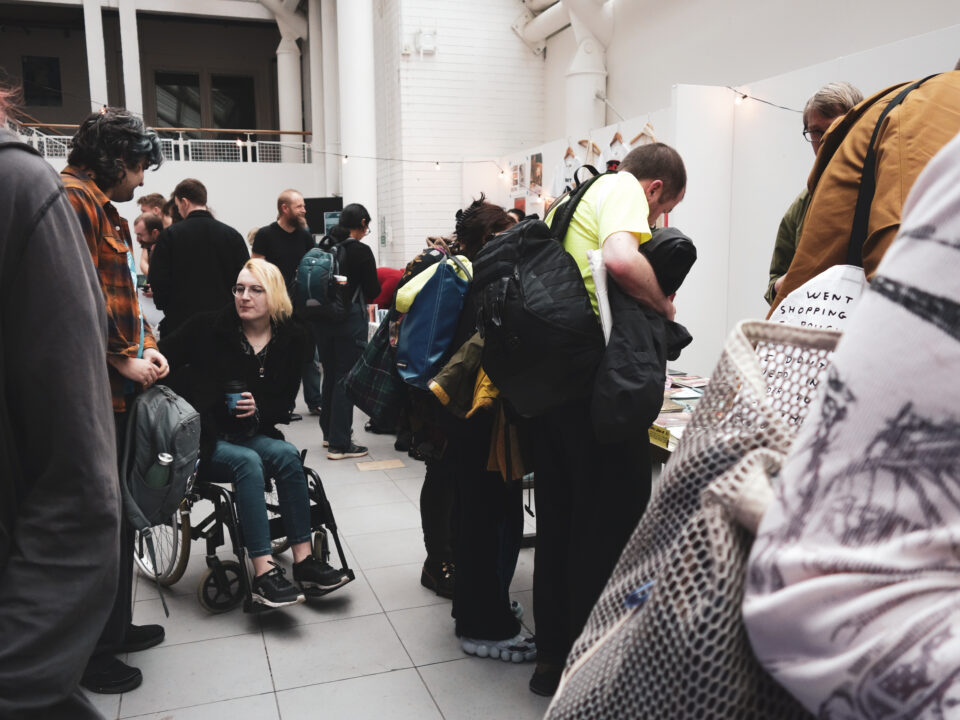
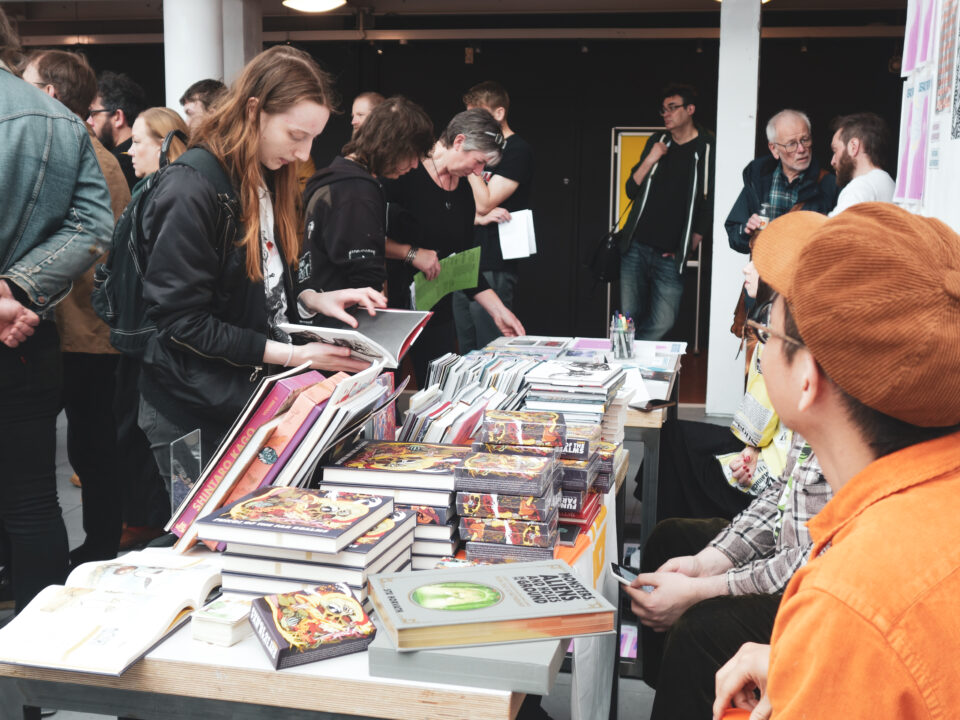
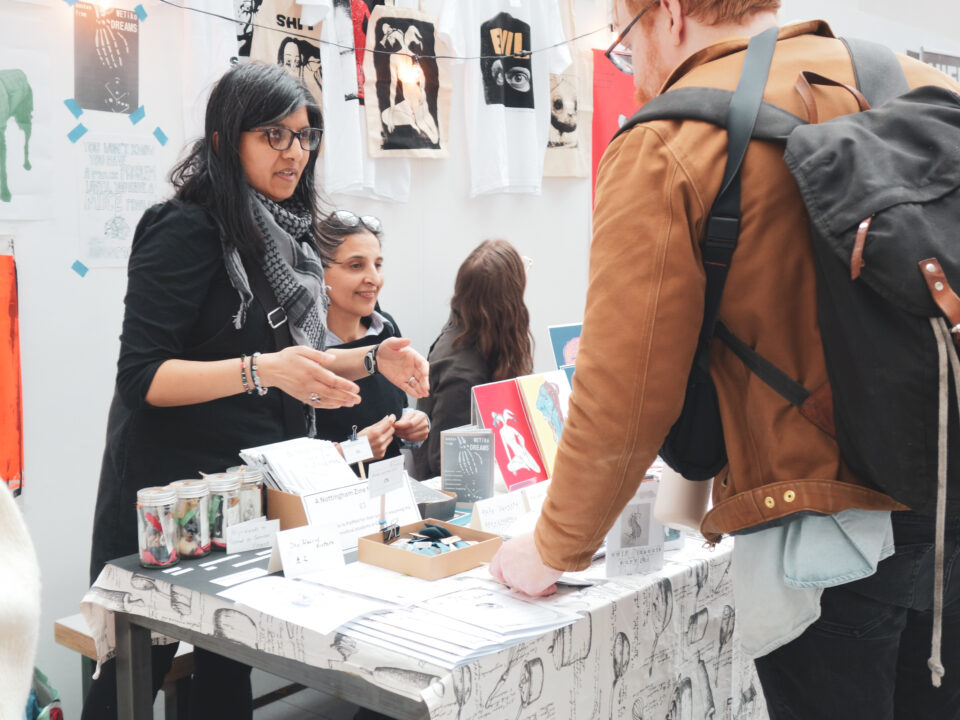
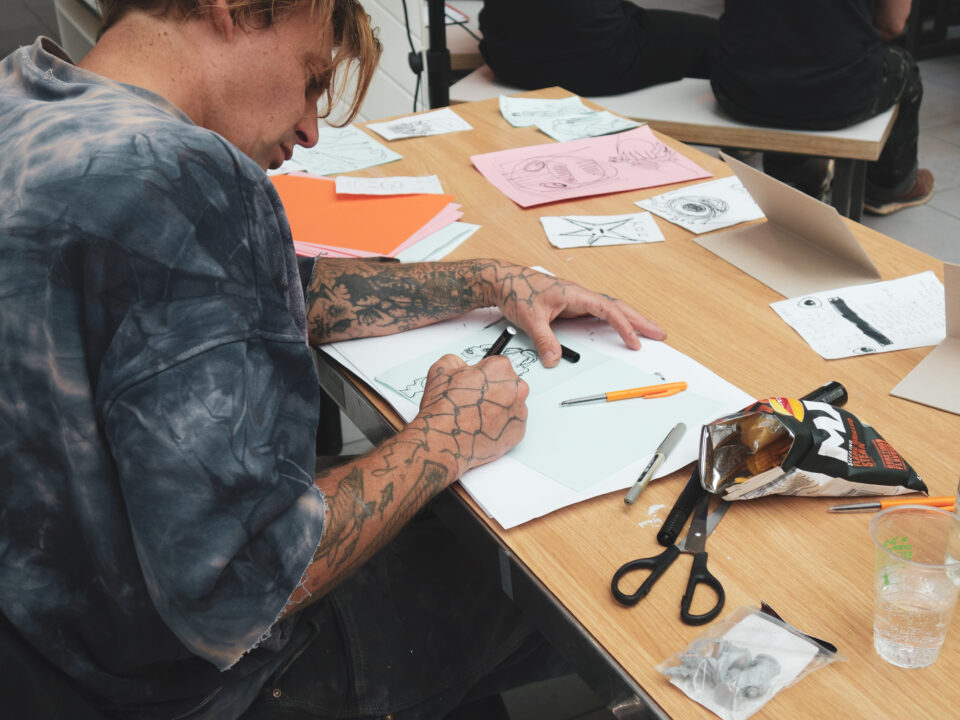
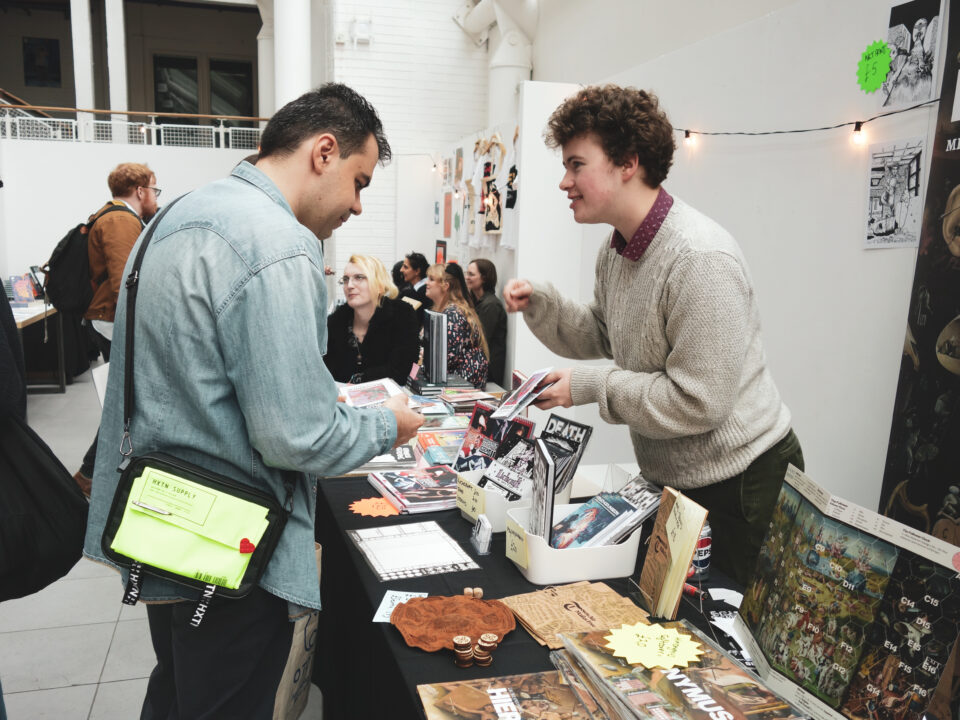
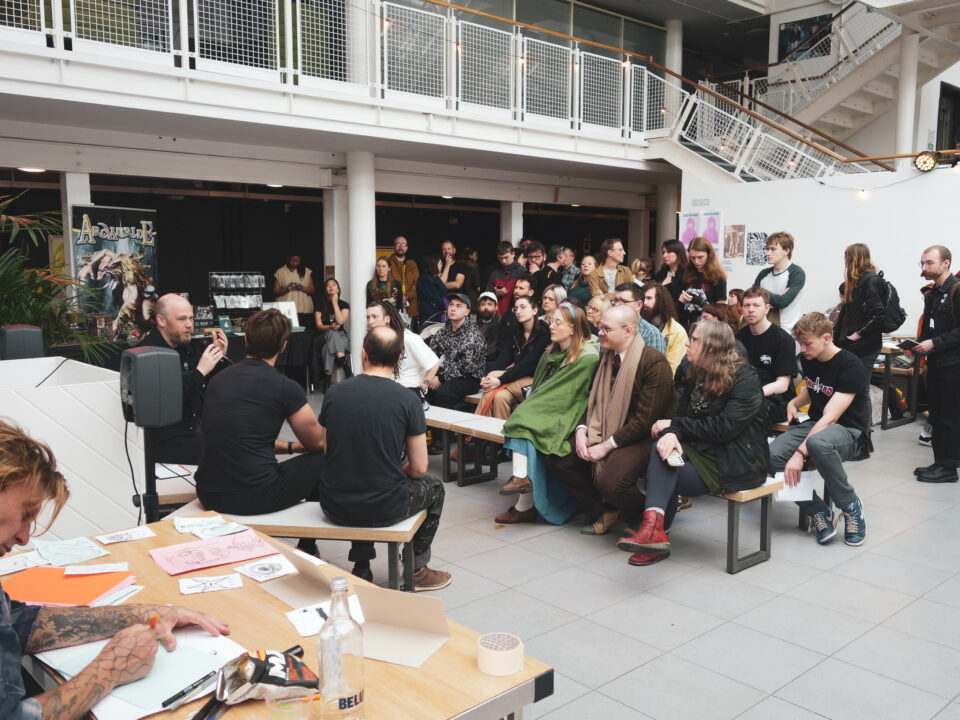
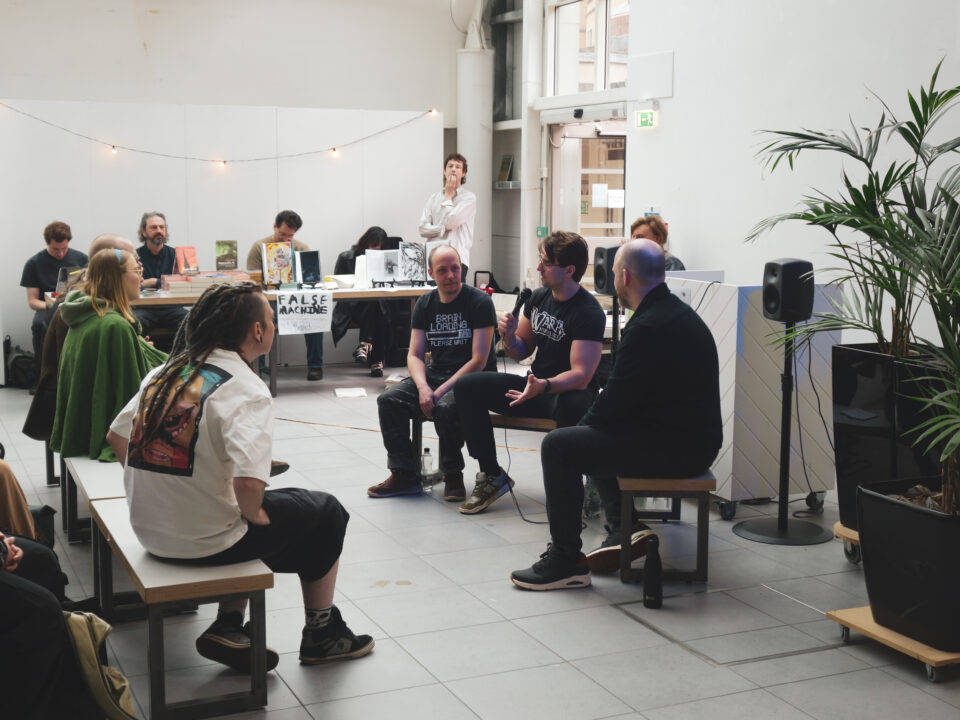
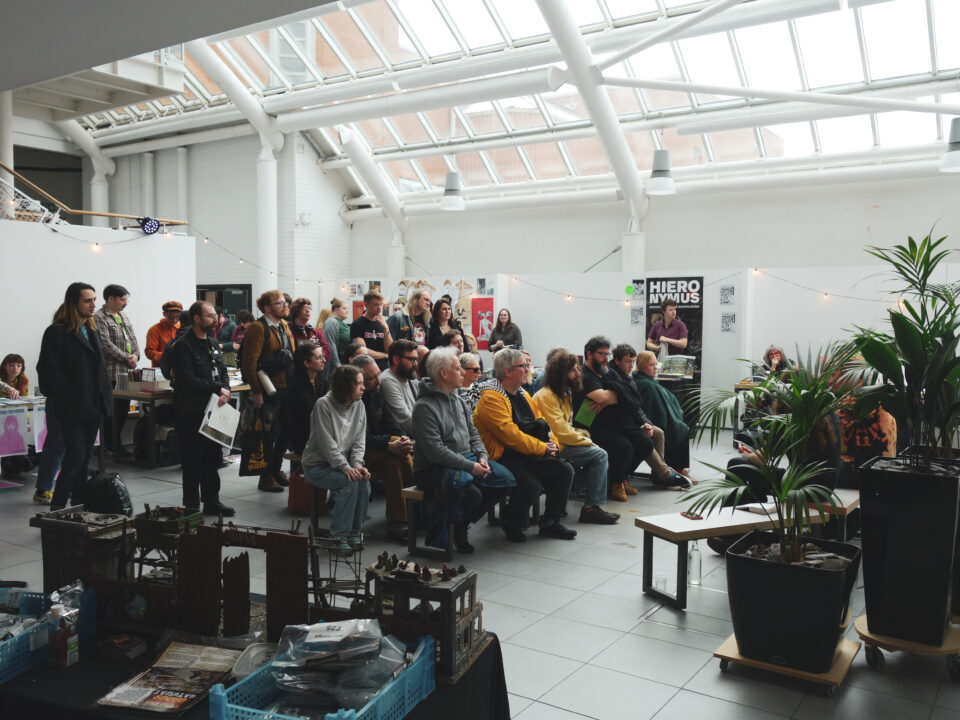
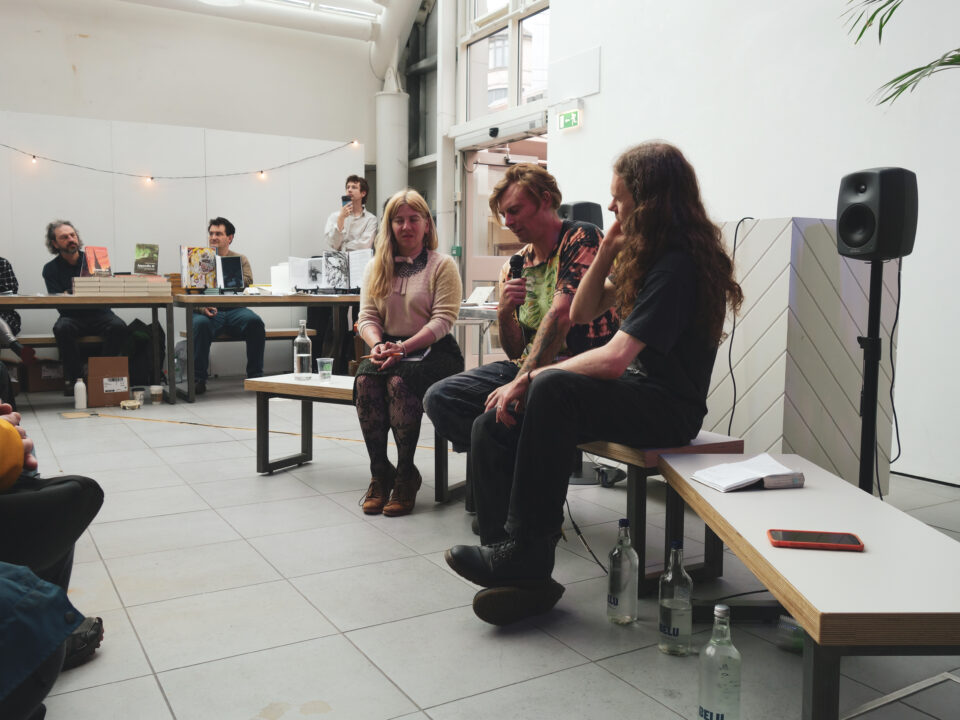
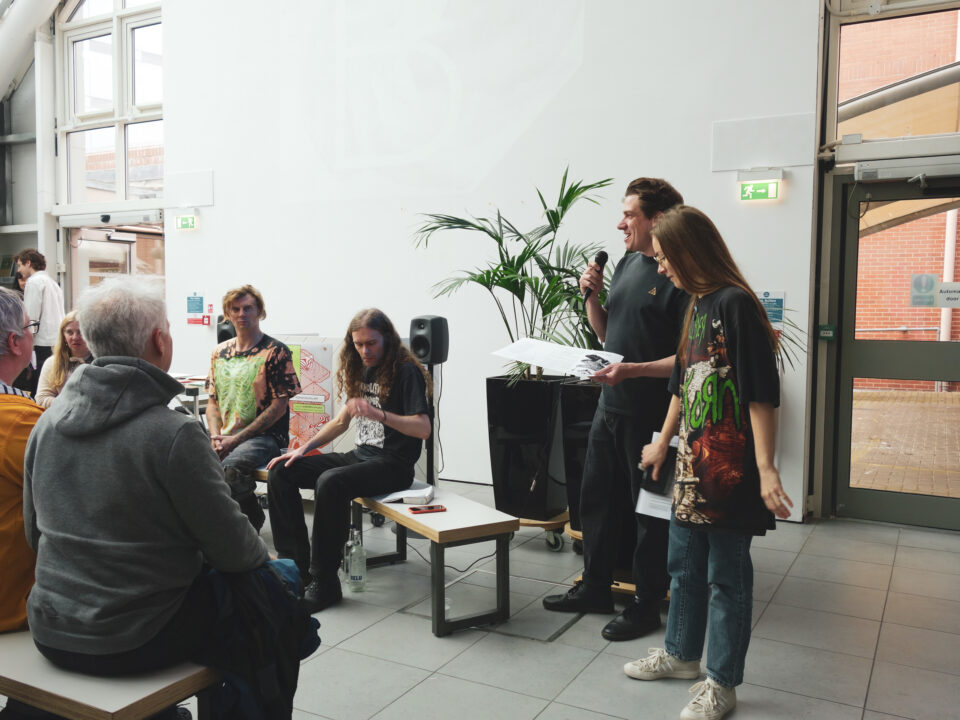
We are delighted to be dedicating the final Vitrines instalment of our 2024/25 season to archive material, information and clothing that documents the dynamism of the independent fashion scene of Nottingham in the 1980s.
In the years following Beeston-born Sir Paul Smith’s ascendency from a 3x3m store on Byard Lane in 1974 – to bases in London, Paris and Tokyo – many local fashion brands were established, including several by graduates from ‘Trent Poly’, who bucked the moving-to-London trend by committing themselves to the city and starting a new generation of independent labels. Homegrown brands such as G Force, Olto, Vaughan & Franks, Katsu and Cocky’s Shed were a just a few…
These brands combined talent, style discernment, DIY attitudes and cheap rents to start labels, open shops, and form global influence and connection. At one point the city even gained its own style pages in the form of Déspatch, Relay and Débris magazines, providing content as broad ranging as fashion editorial featuring local and international designers, montages of nights at The Garage, and signposting visitors to the shops and studios that were physically and ideologically a long way from the High Street.
The fashion scene that developed placed equal importance on both studio and social time, building a network of close-knit creatives who collaborated and supported one another. This community incapsulated many of the same qualities that gave rise to other significant, and perhaps more well-known cultural communities such as the city’s music, cinema and contemporary art scenes.
The aim of this presentation is to celebrate and help establish a legacy for this important period within the city’s [sub]cultural history. An open call for materials will run in the lead-up and during the exhibition, allowing anyone to submit related materials that will join the exhibition and evolving noticeboard.
Accompanying the exhibition is a suite of specially commissioned essays by independent scholar Ian Trowell. Ian has also provided curatorial consultancy and research to this project, having interviewed several of the key protagonists of that era. Ian writes on subjects including UK subcultures, music, fashion, popular culture, art and media. His book Throbbing Gristle: An Endless Discontent was published by Intellect Books in 2023.
This exhibition has been co-curated with Dr Katherine Townsend, a researcher, educator, practitioner and Professor in Fashion and Textile Practice in the Fashion, Textiles and Knitwear department in the School of Art and Design at Nottingham Trent University.
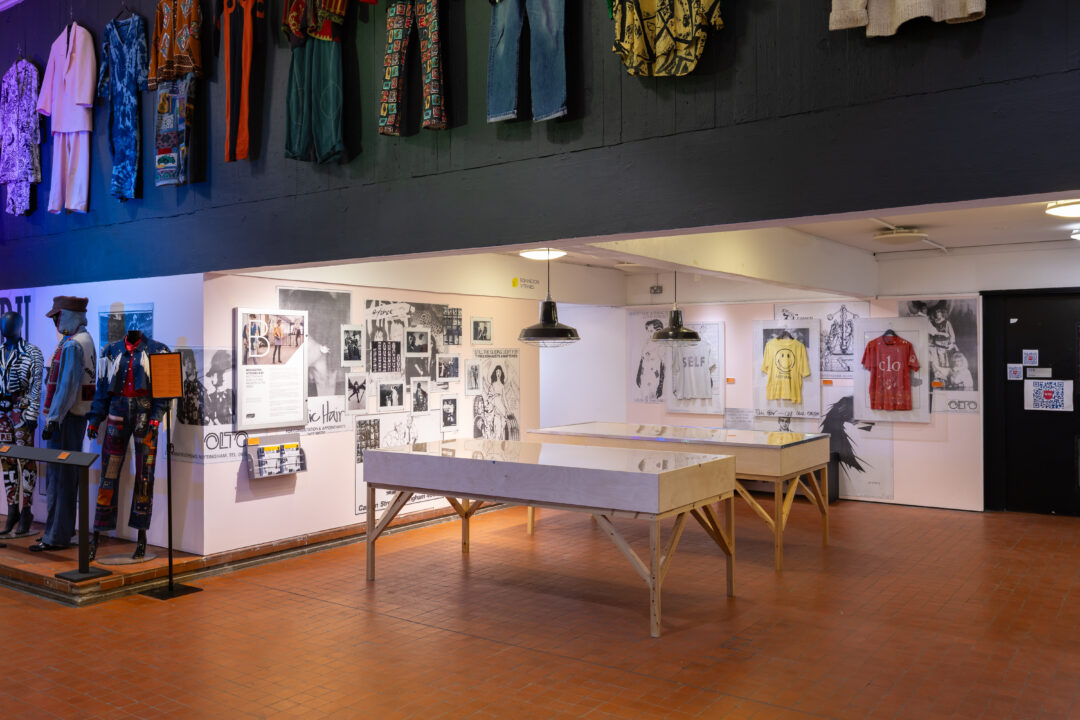
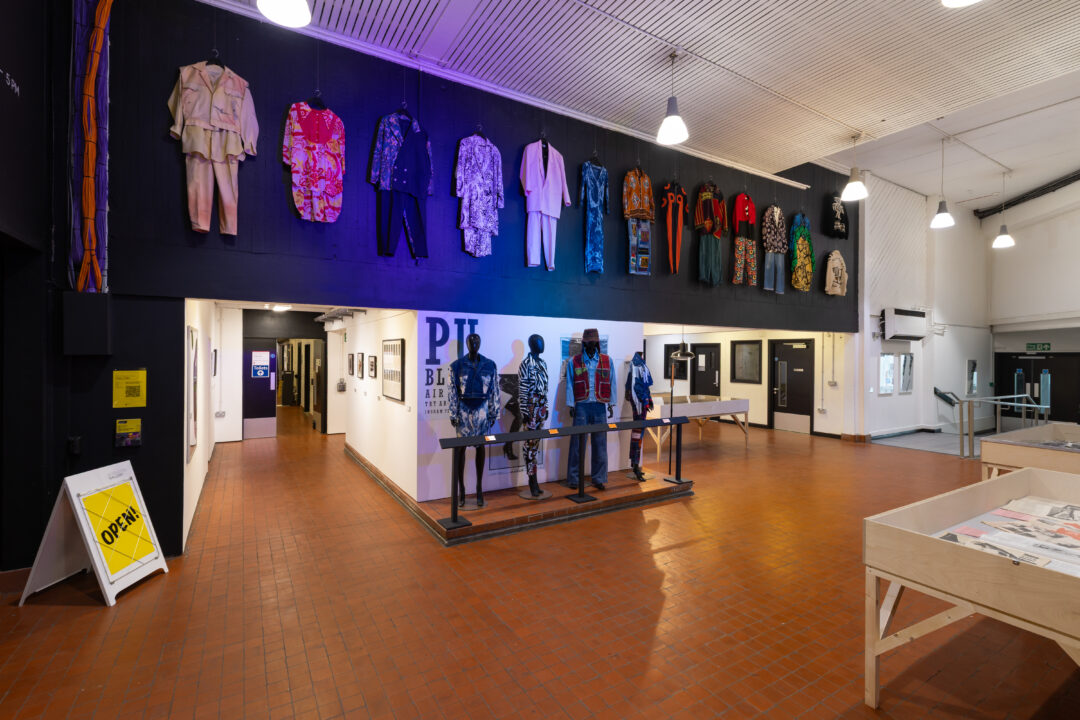
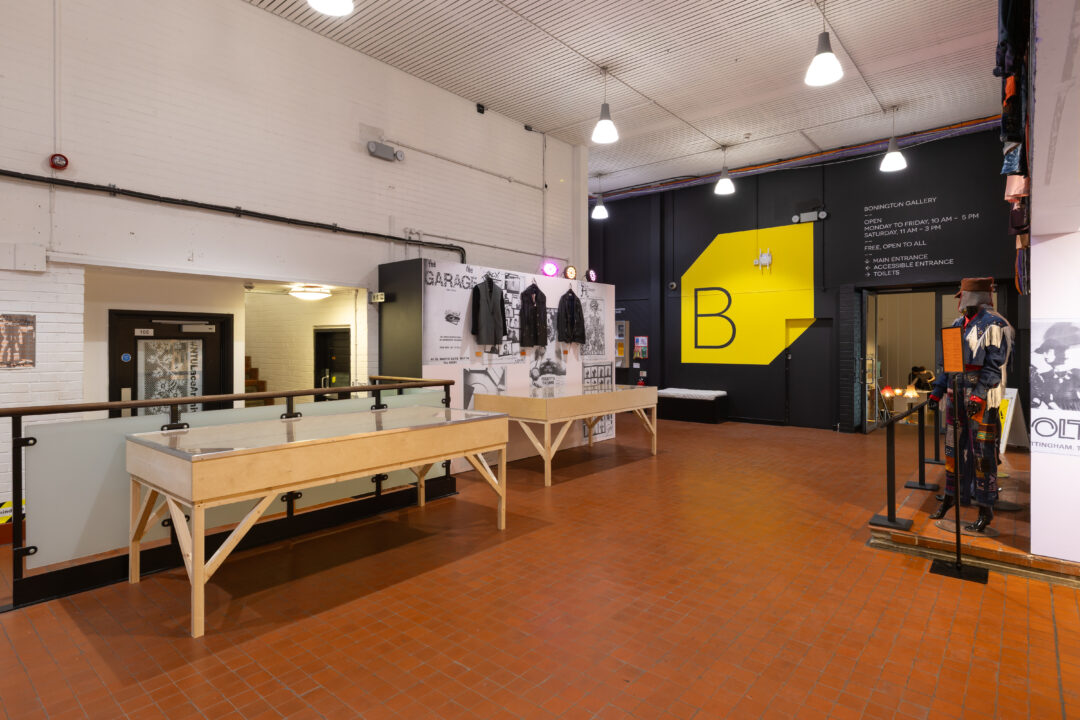
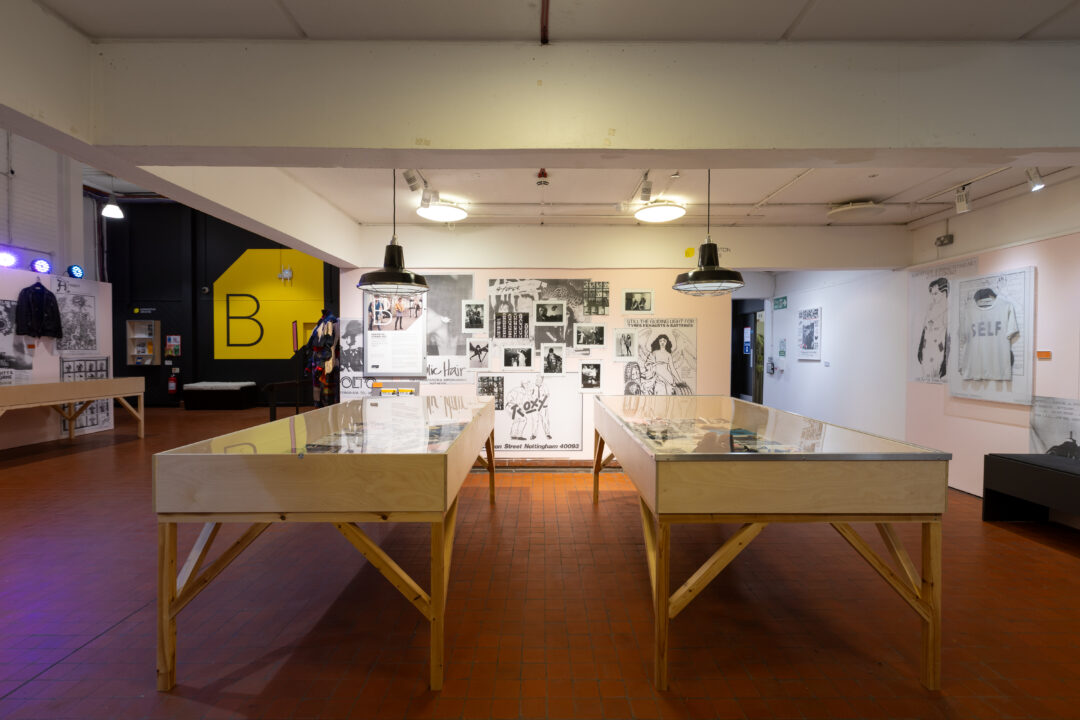
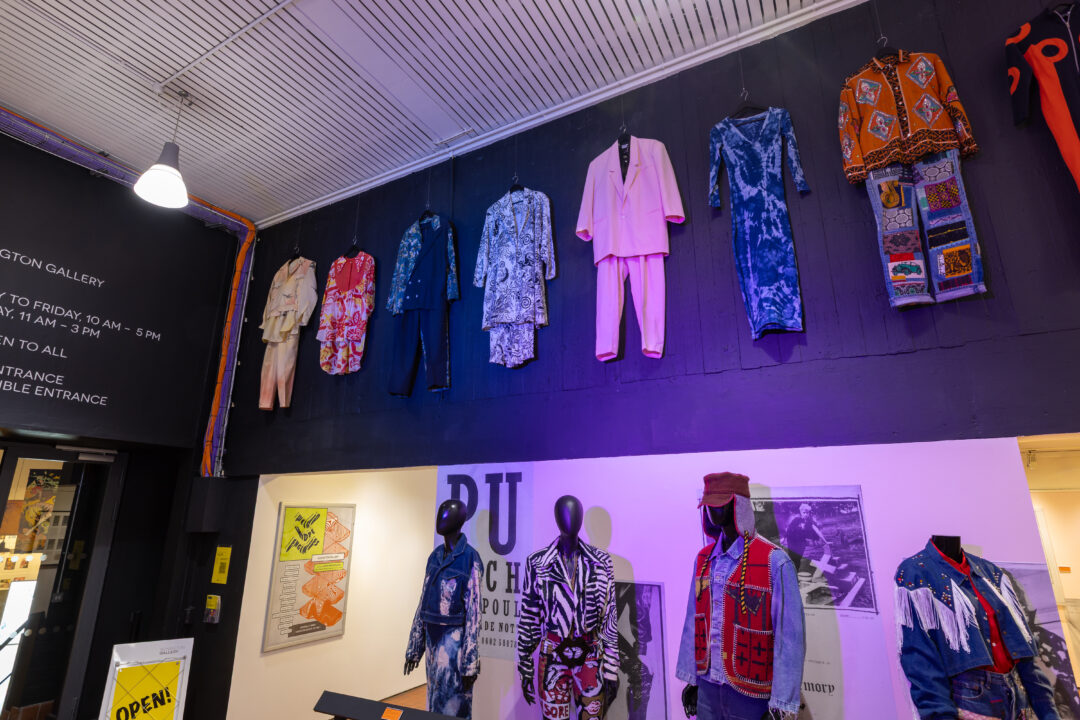
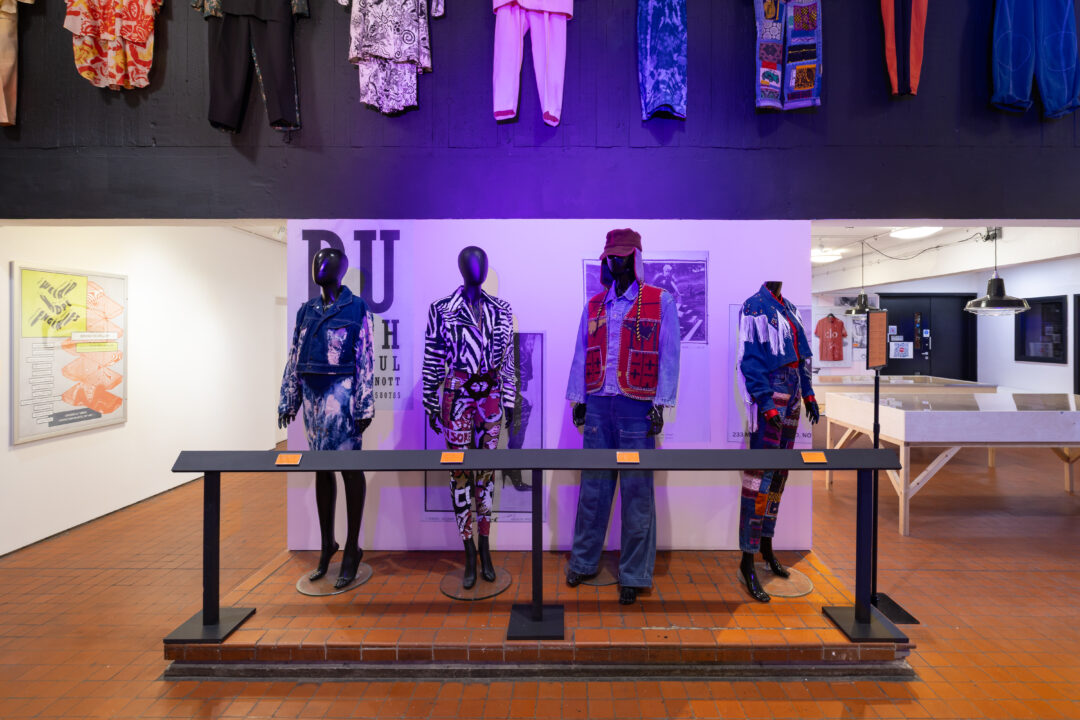
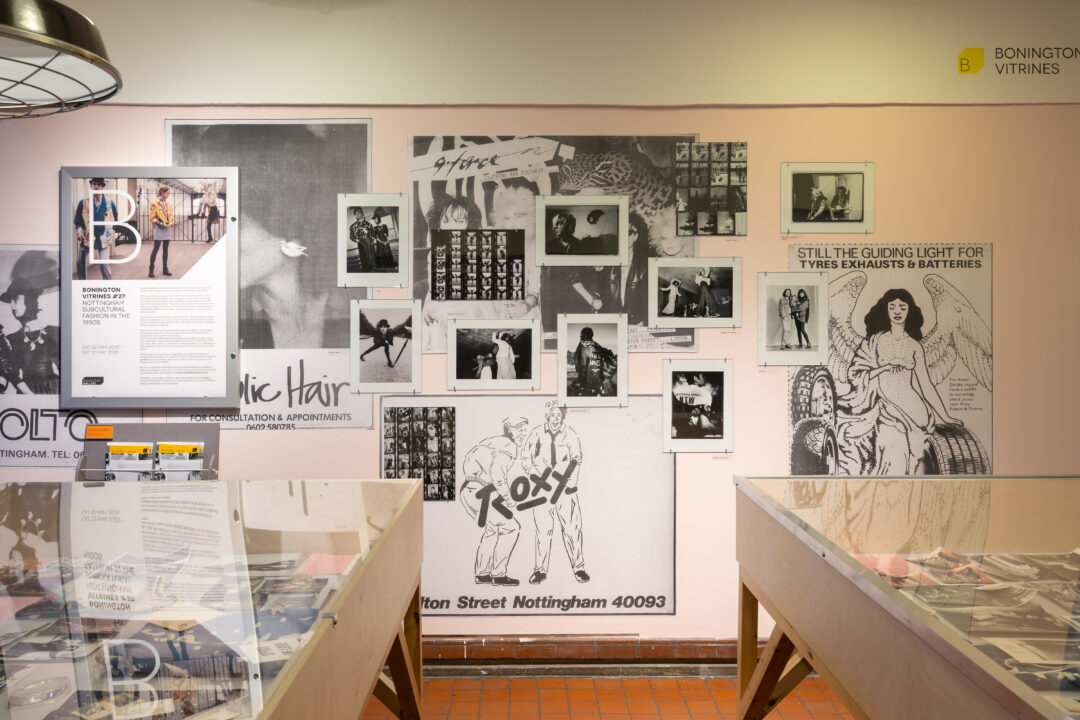
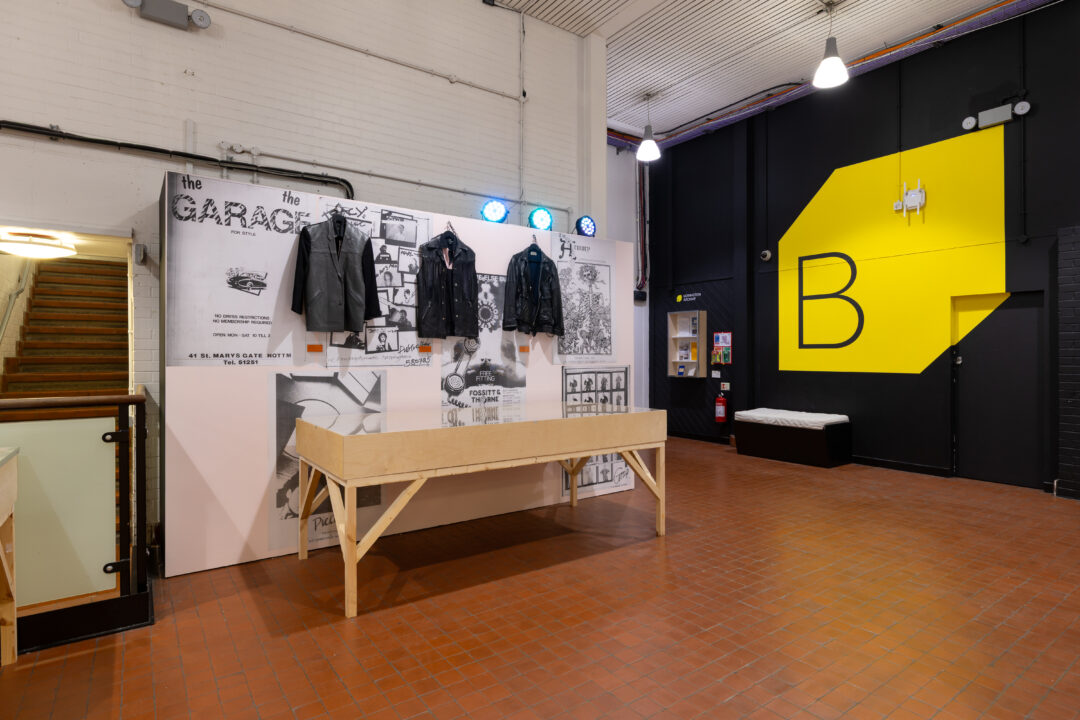
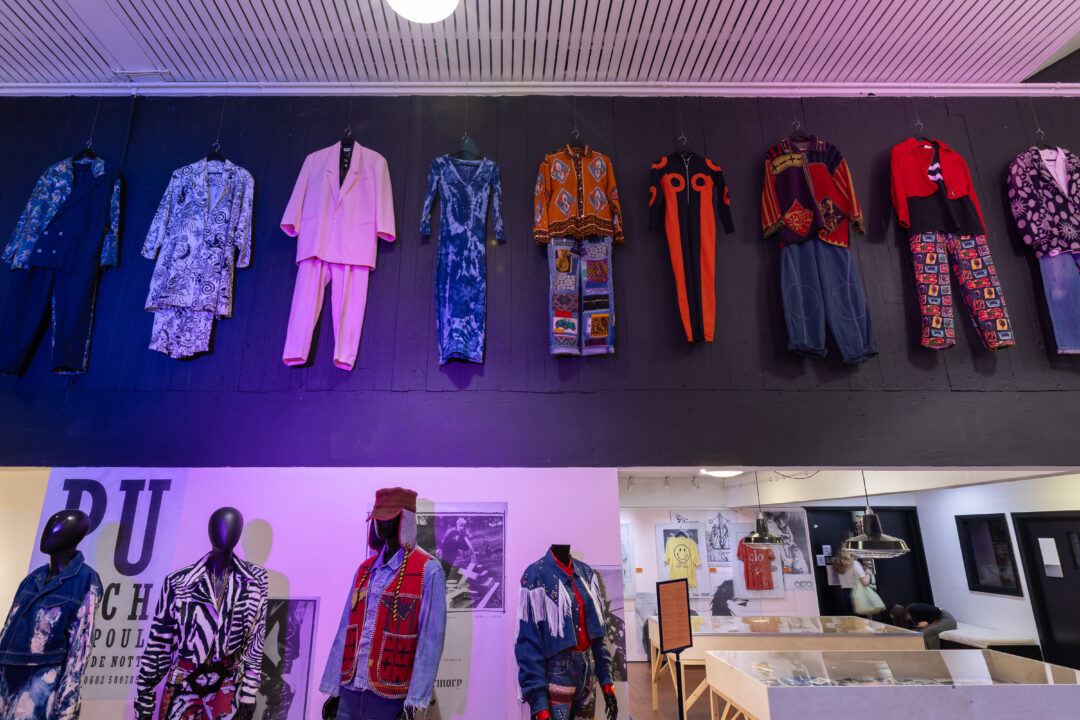
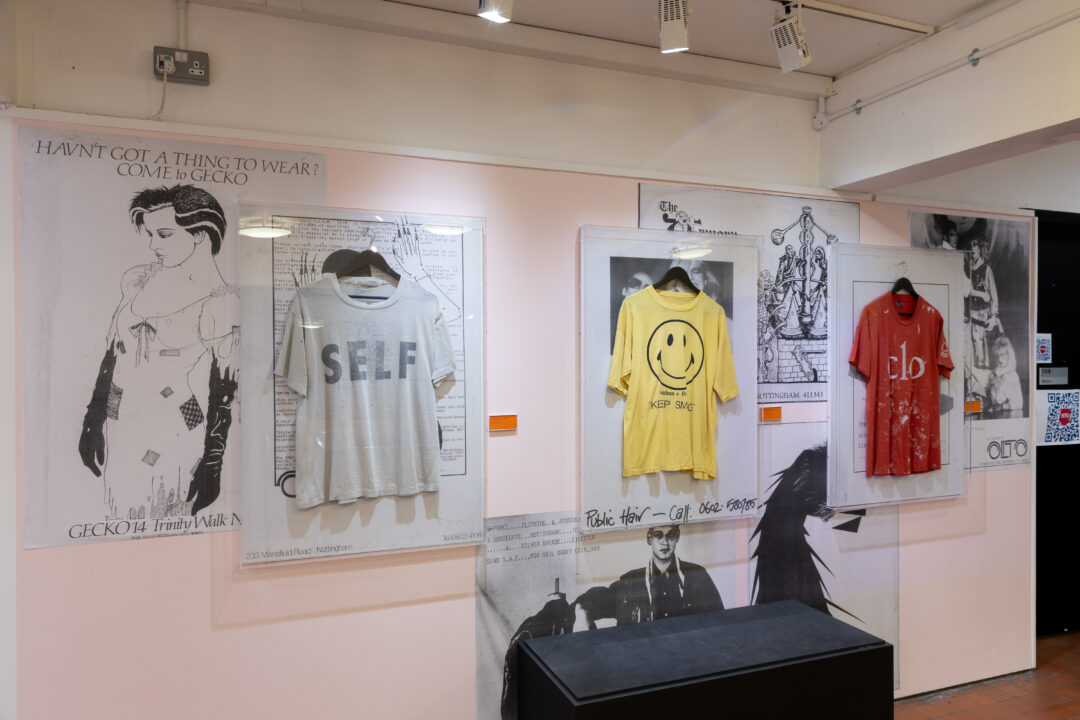
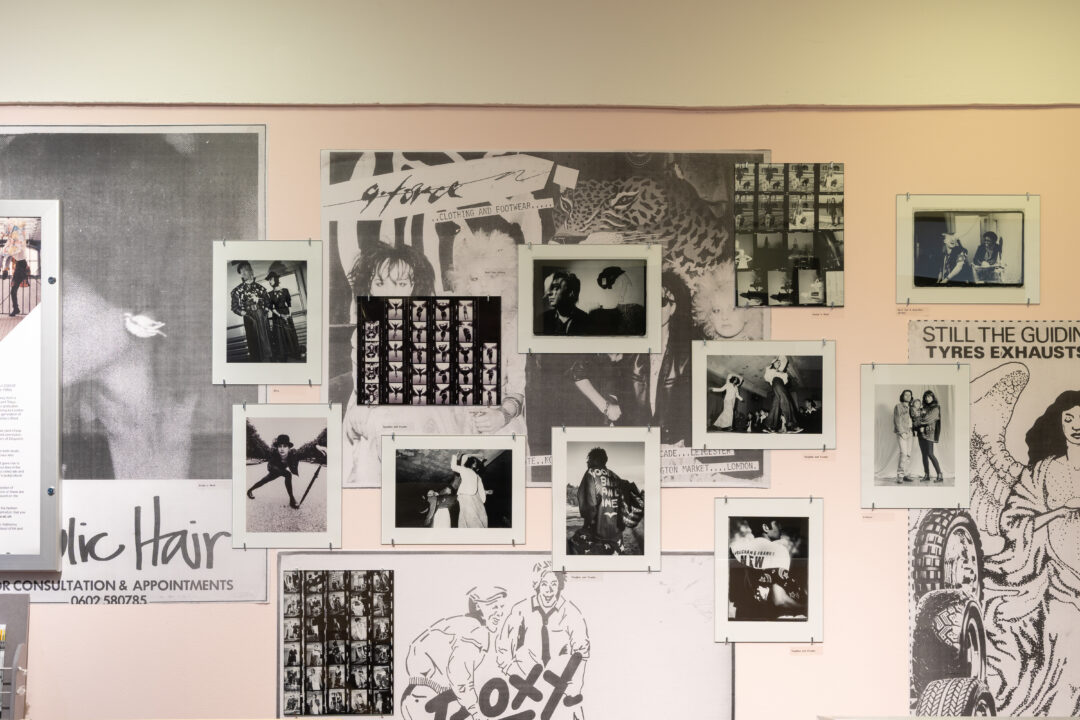
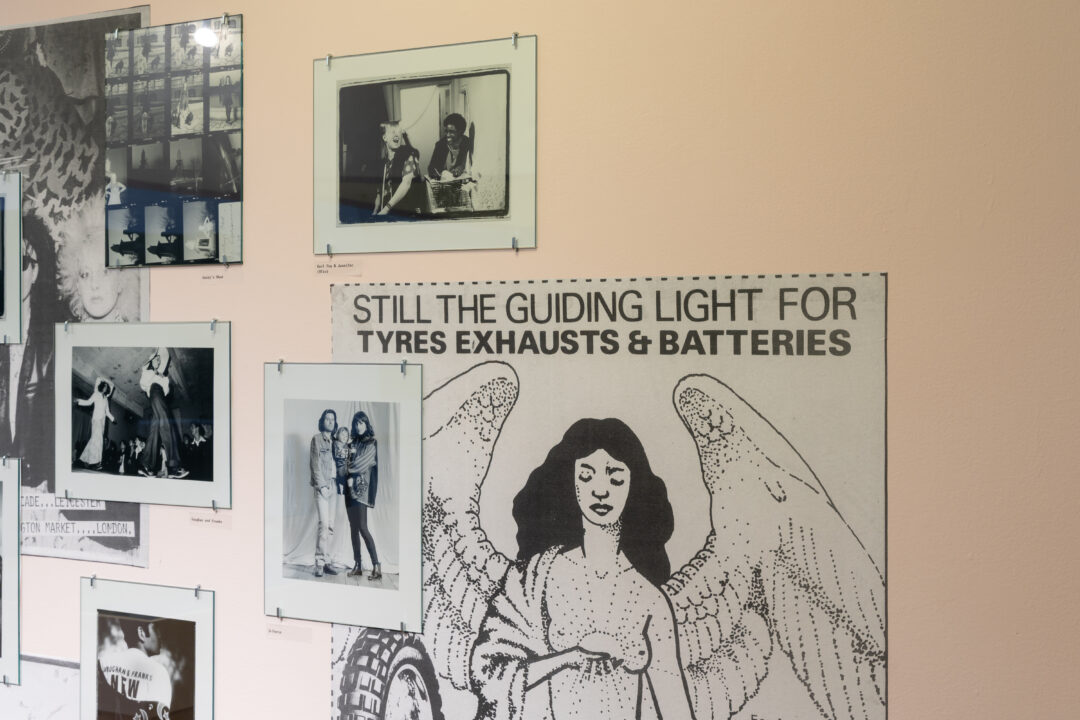
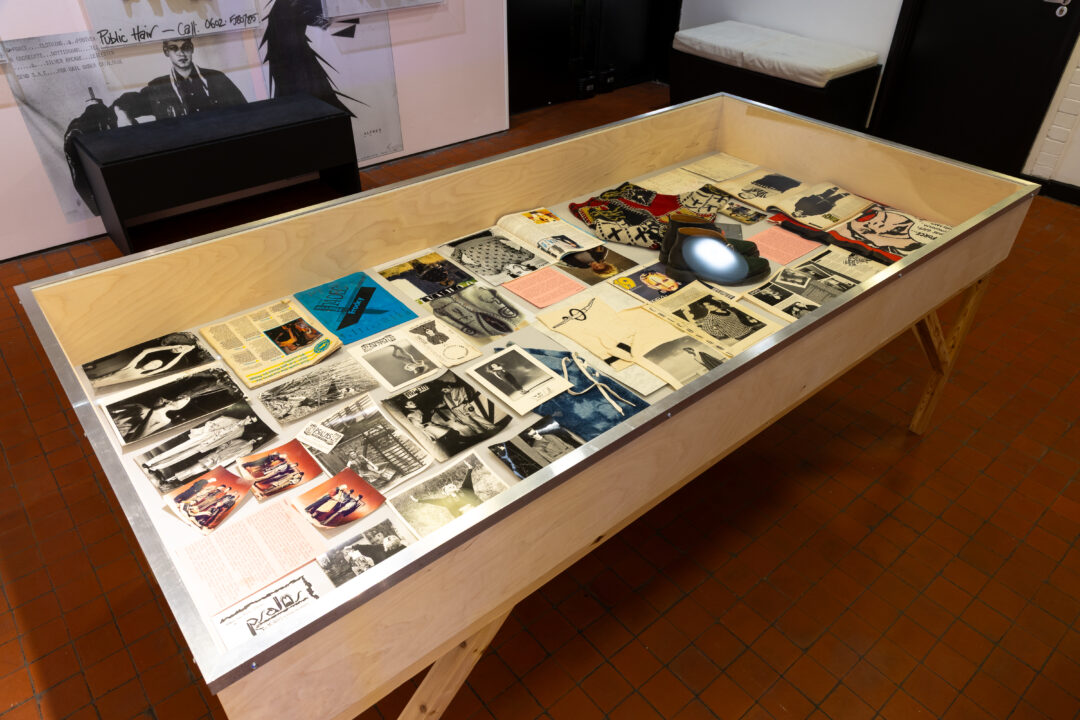
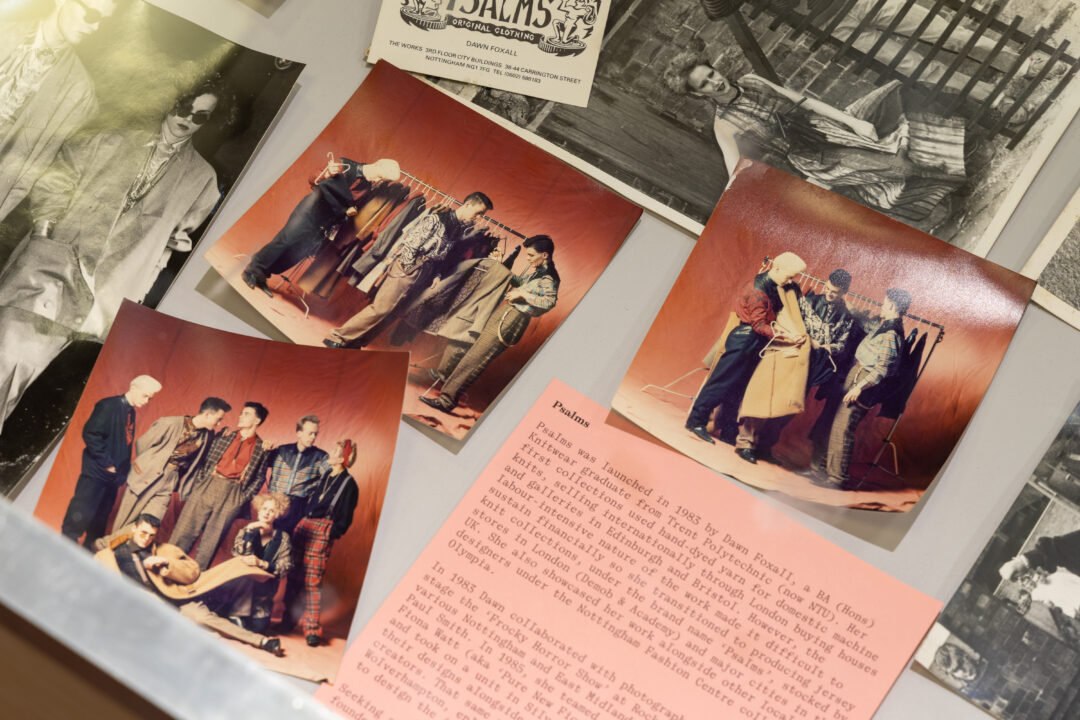
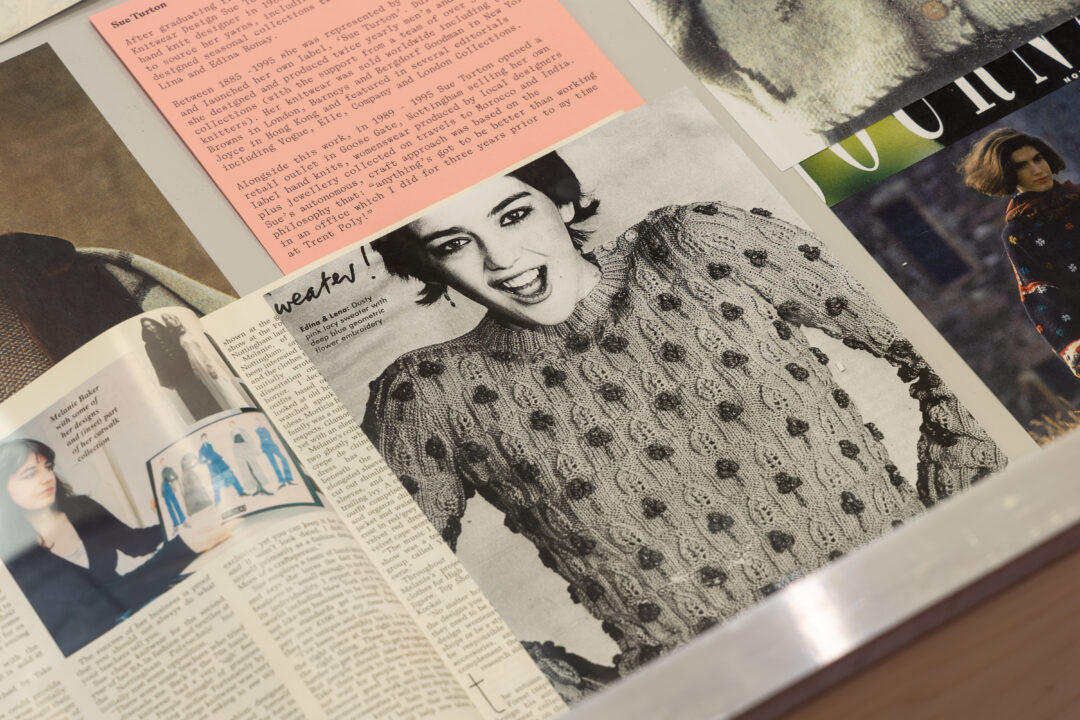
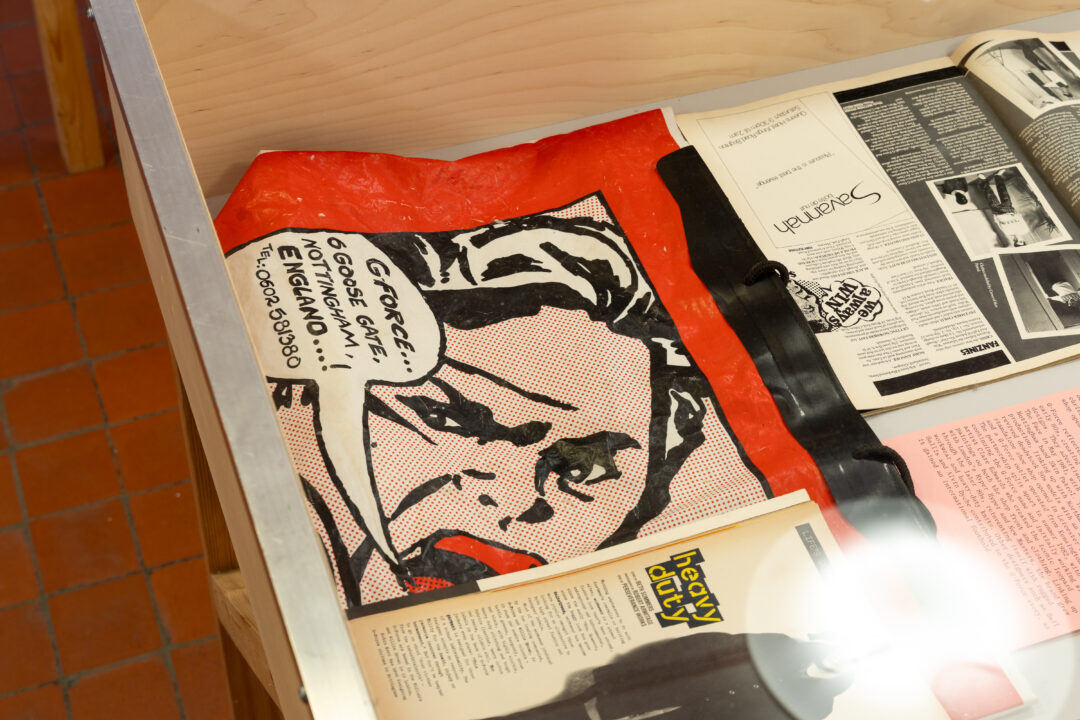
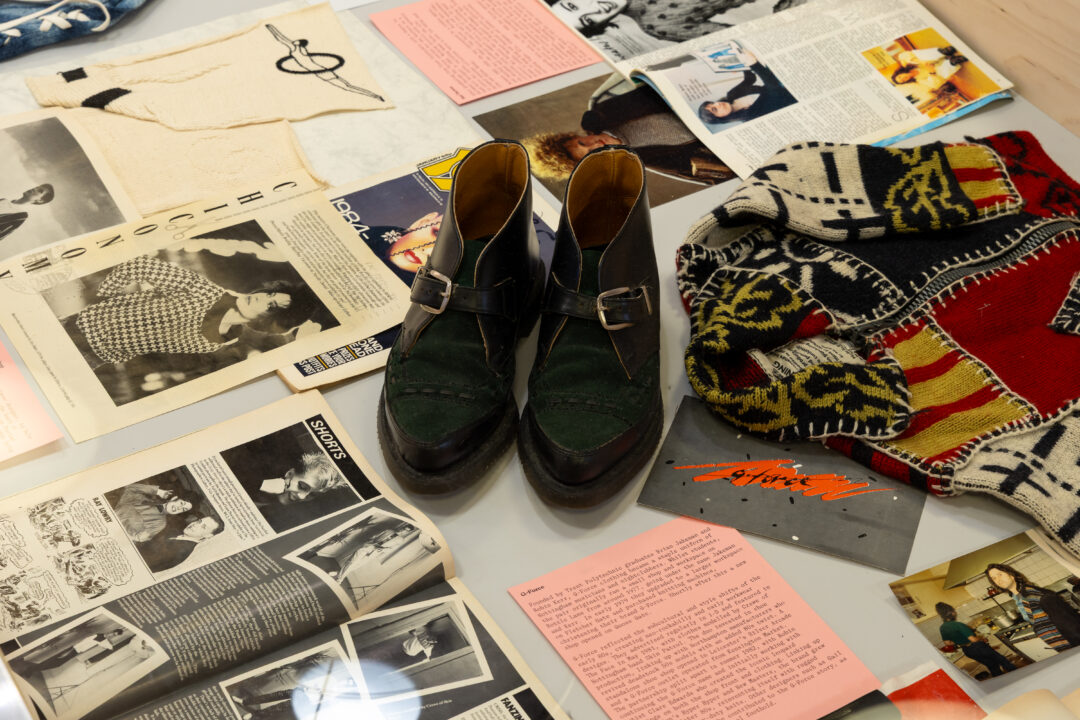
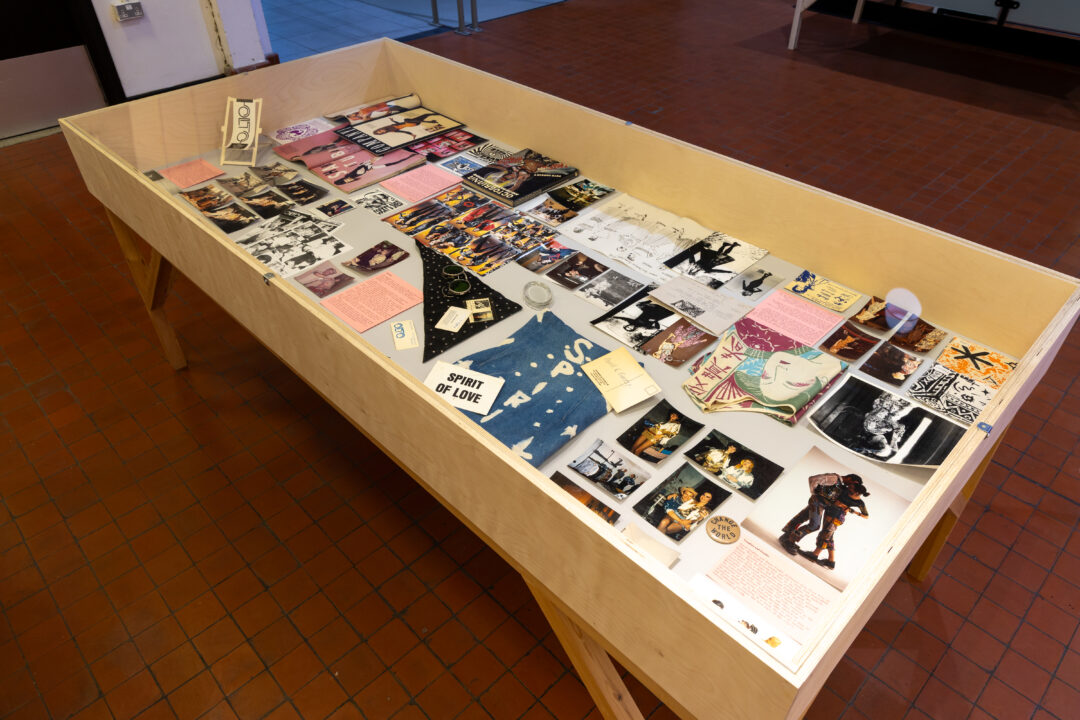
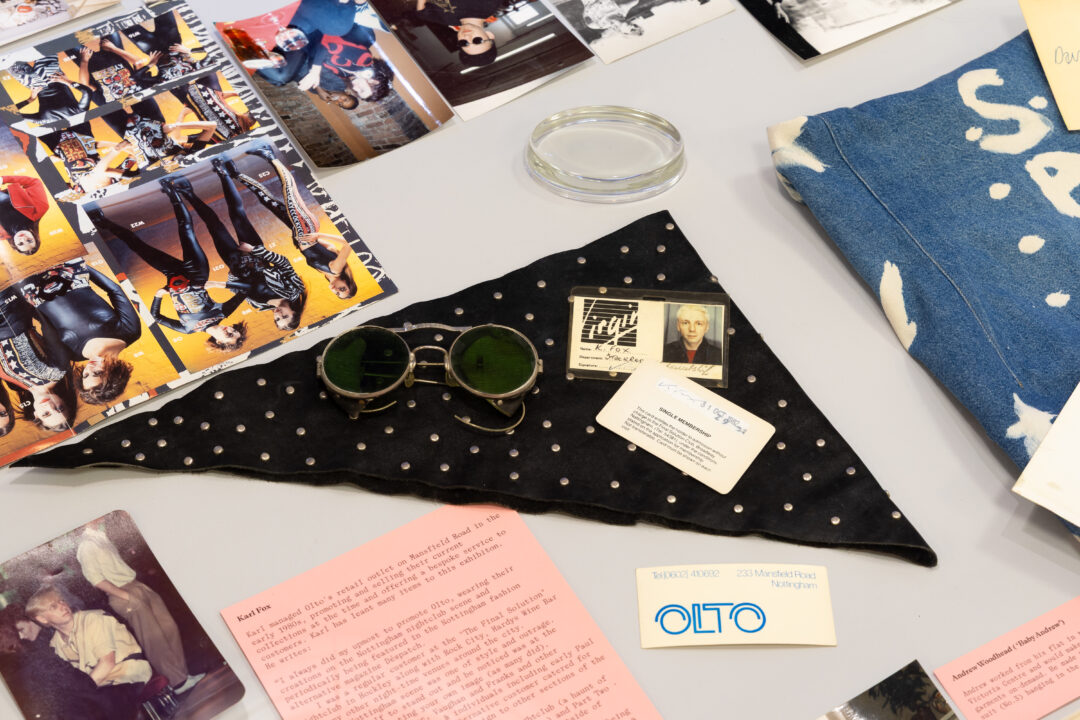
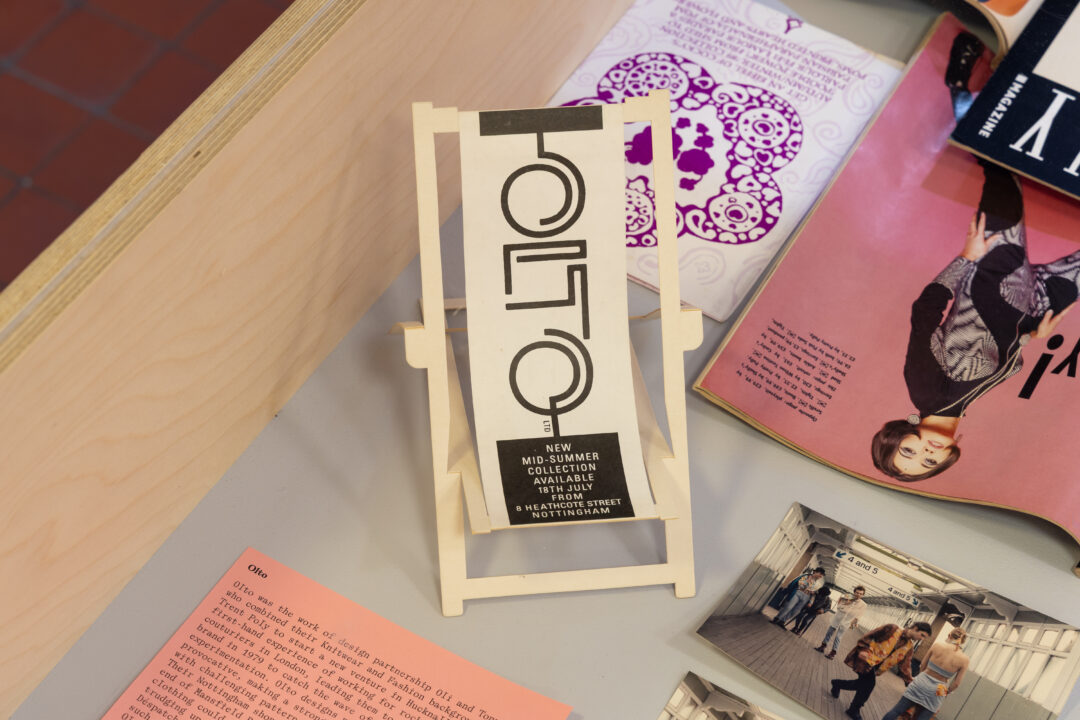
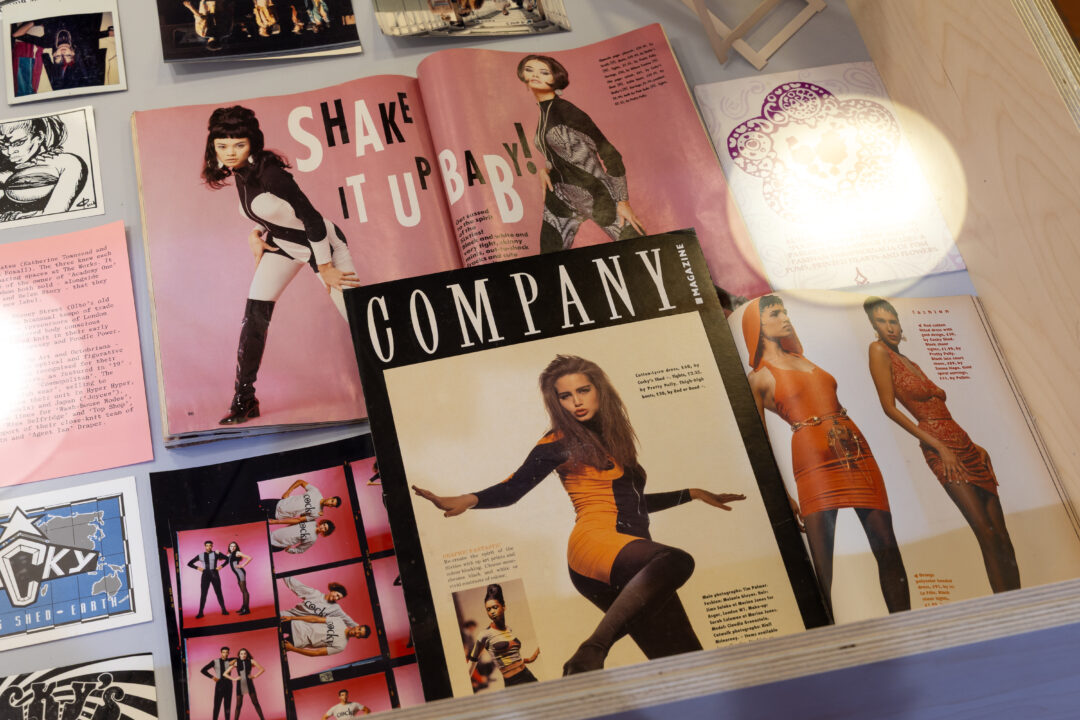
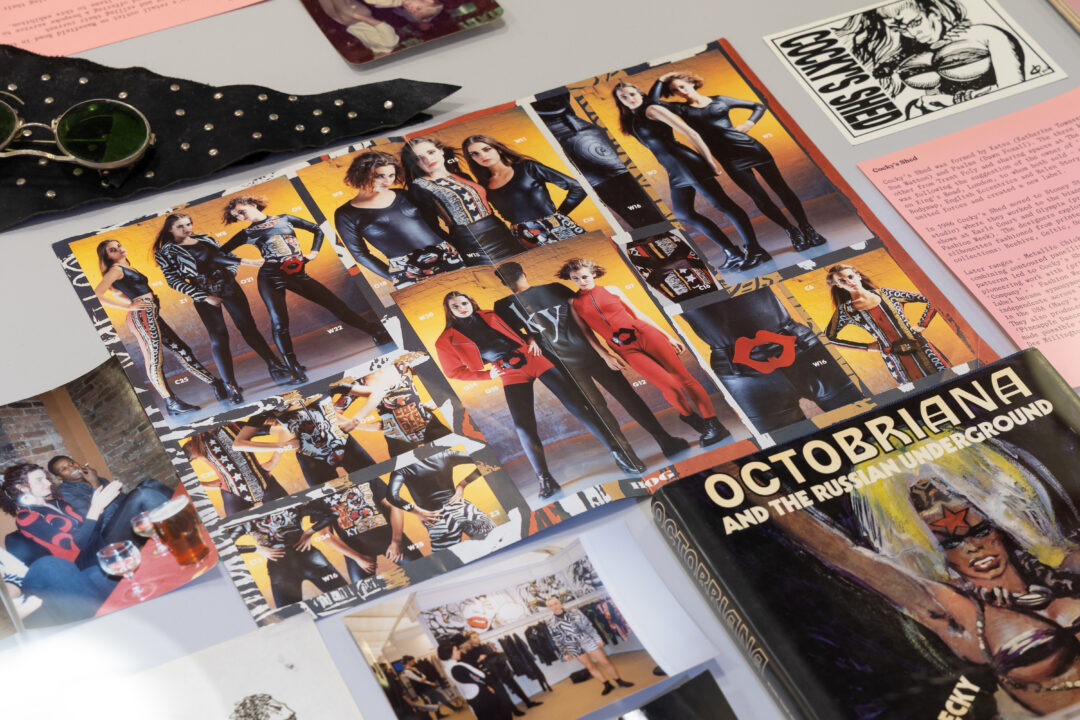
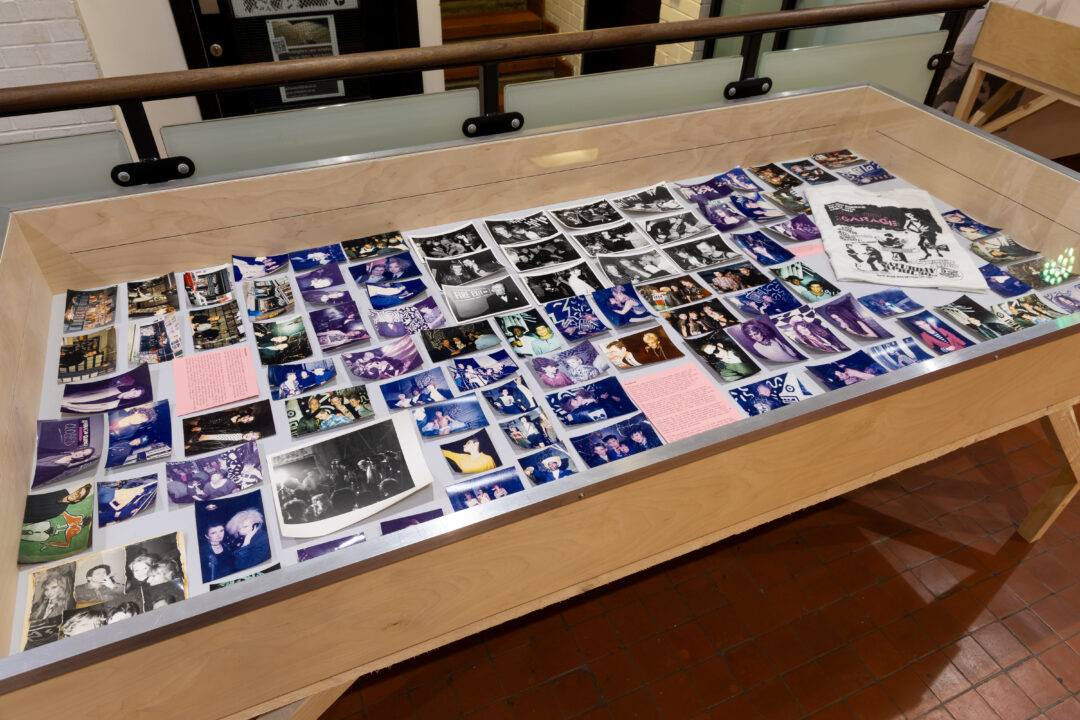
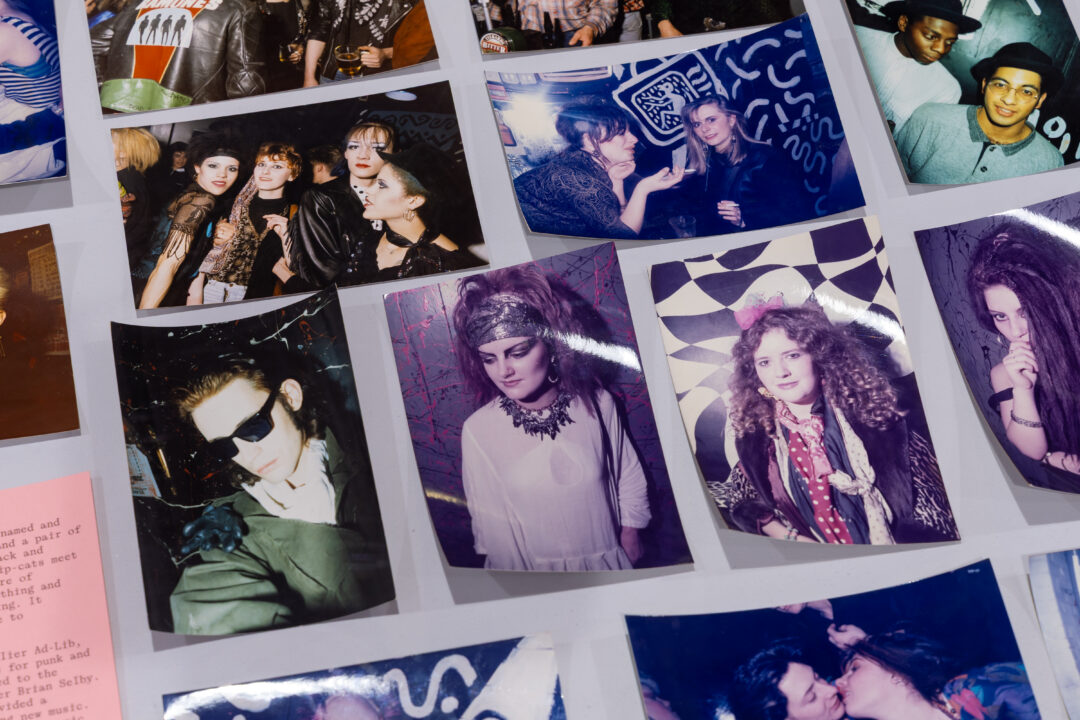
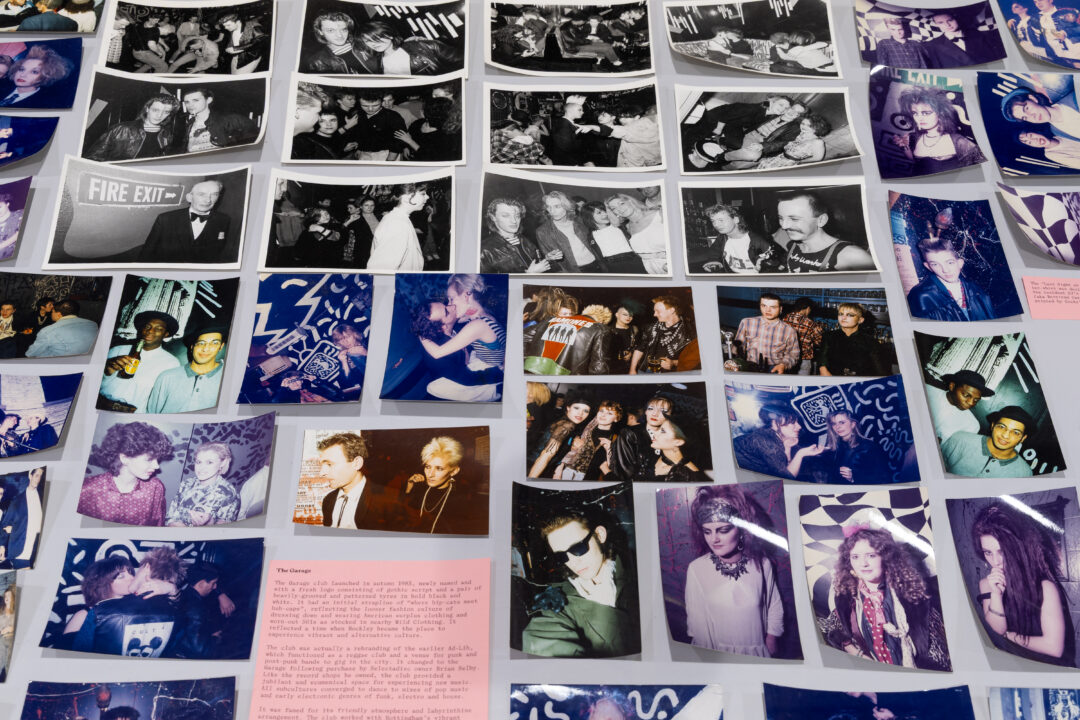
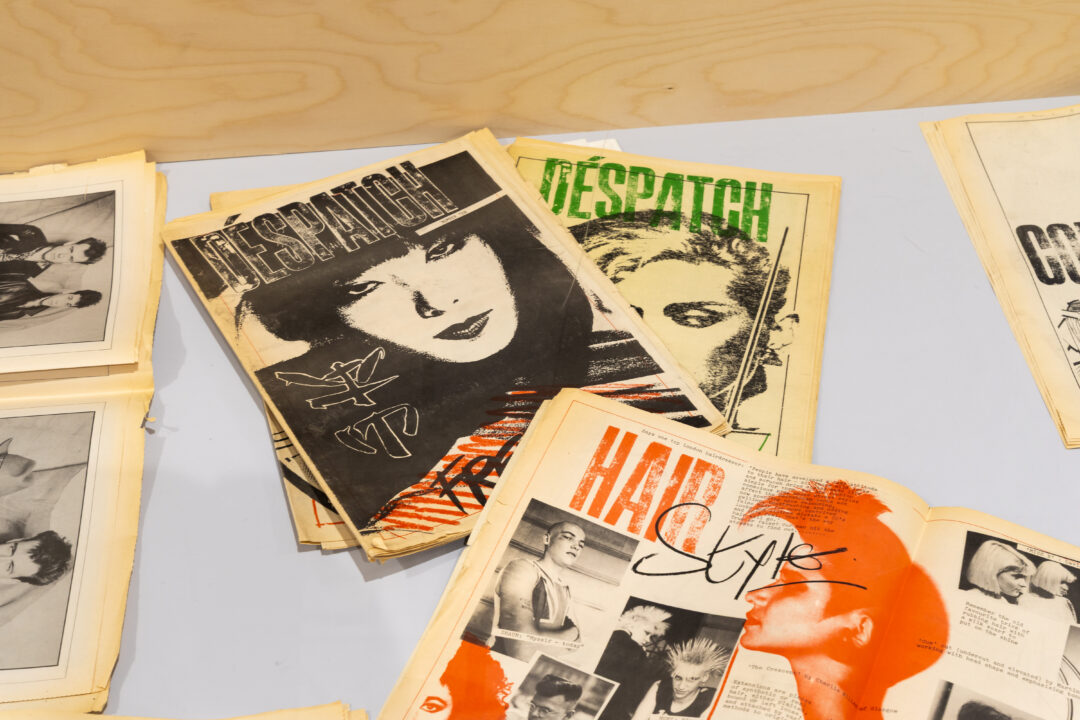
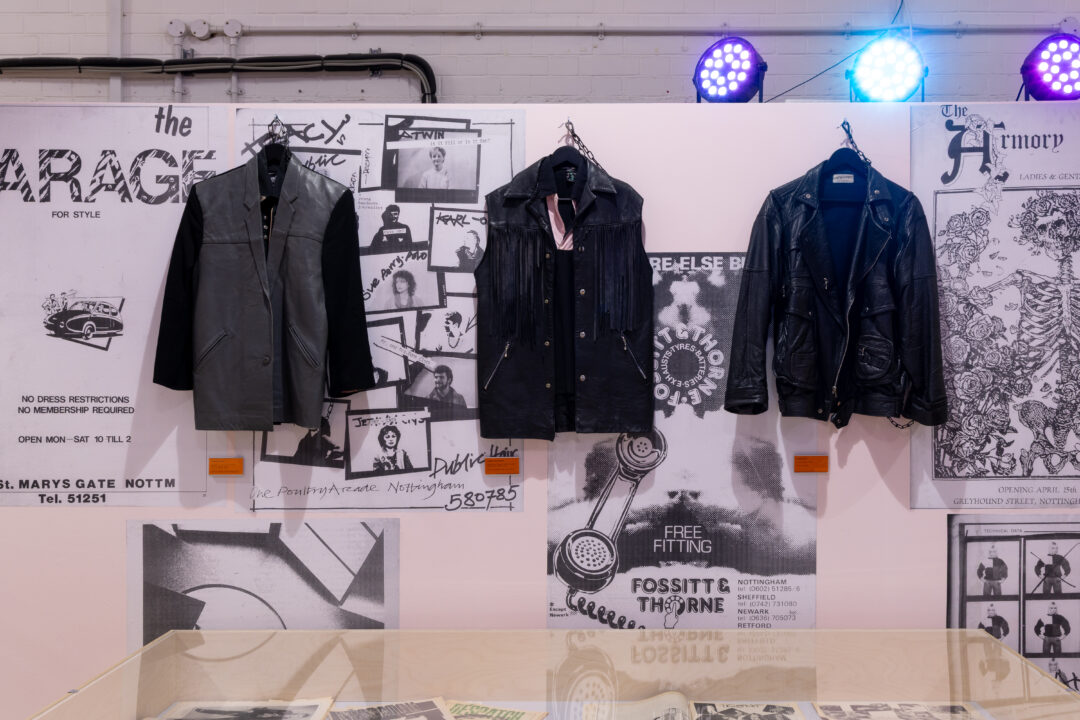
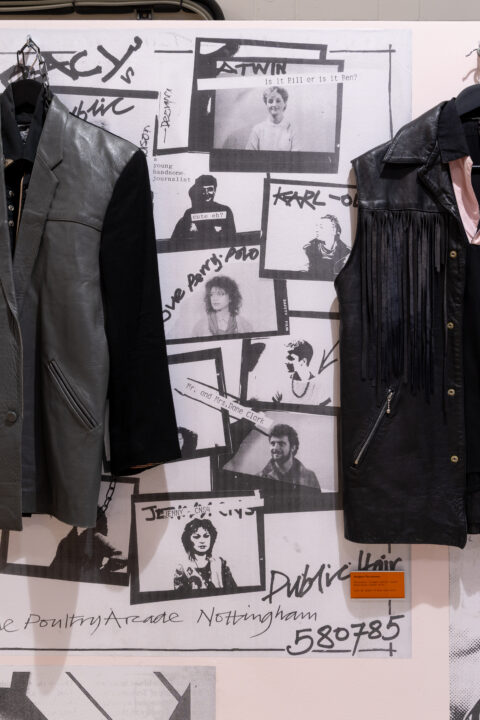

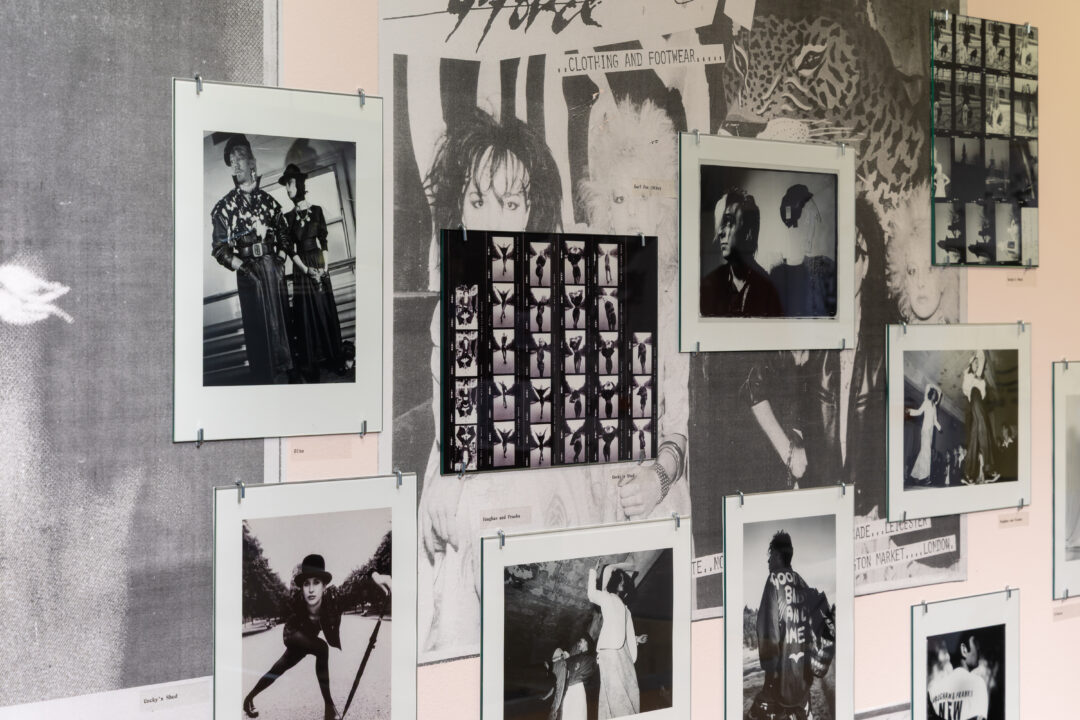
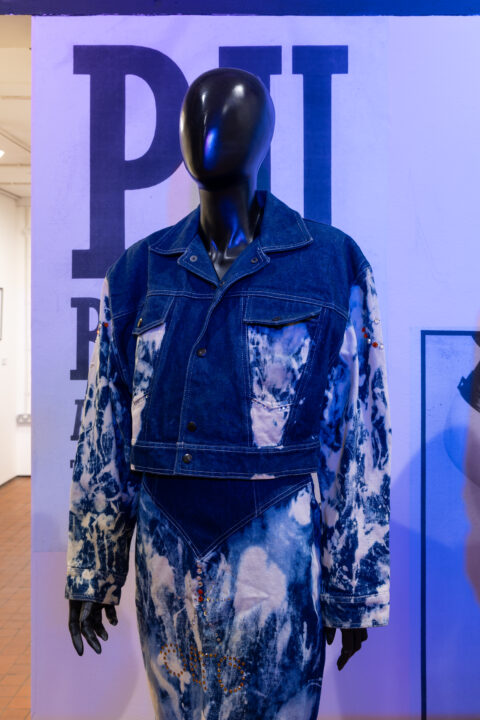
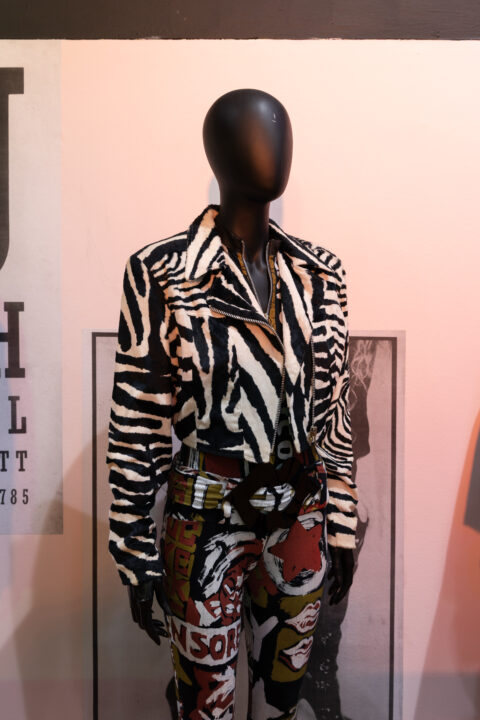
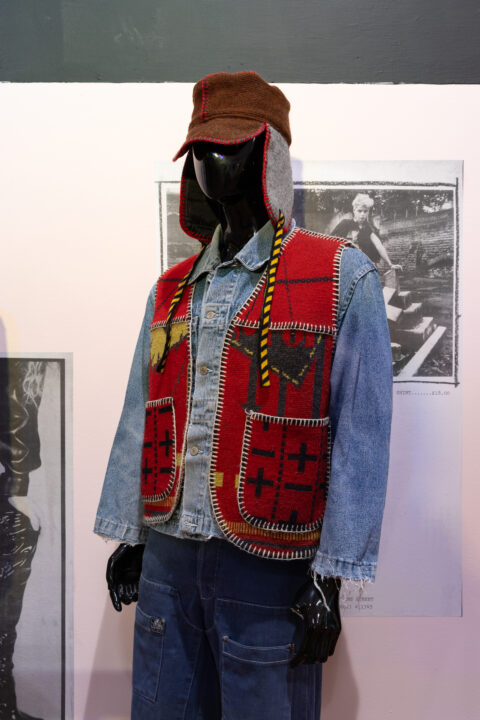
Ian Trowell’s essays
Press
Image: ‘Clockwork Orange’ collection by Olto (now One-BC). Photo by Paul Edmondson, circa 1984.
Join us for a free guided tour of Bonington Gallery’s latest exhibition with BSL interpretation.
Book your free place and enjoy a tour of Bonington Gallery’s second exhibition of the season, Knees Kiss Ground by Motunrayo Akinola, led by the Gallery’s Director Tom Godfrey.
Along with an introduction to the exhibition Tom will talk through the accompanying Vitrines exhibition by The Aimless Archive.
This event will last up to an hour. Please meet inside Bonington Building in the foyer space outside the Gallery doors at 12.55 pm. Free and open to all, booking required.